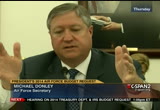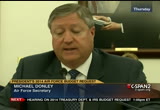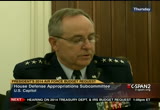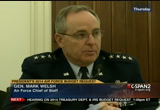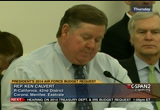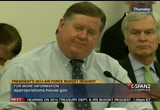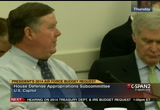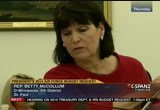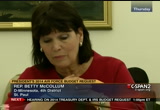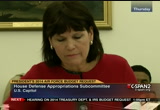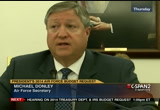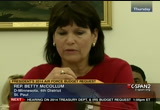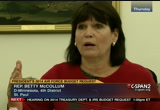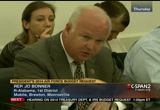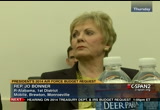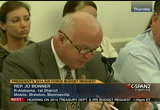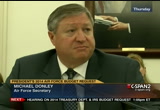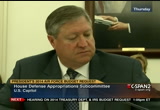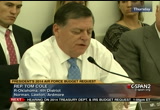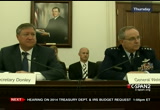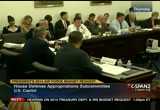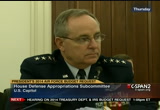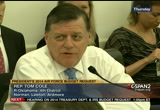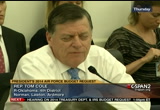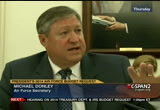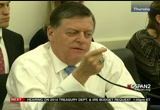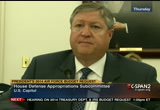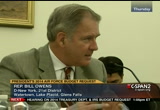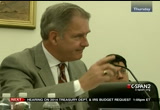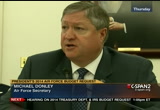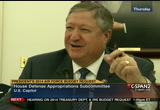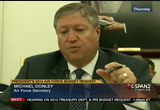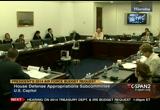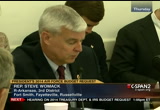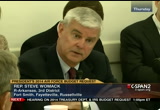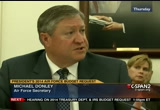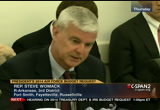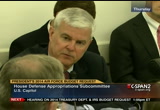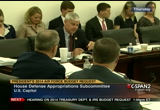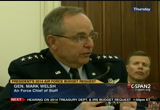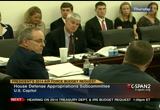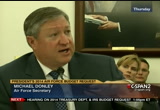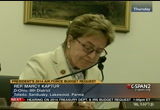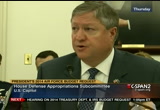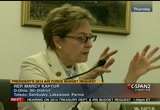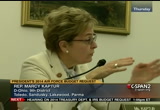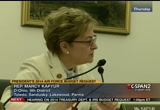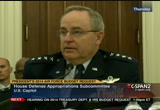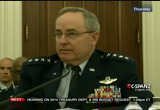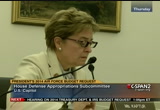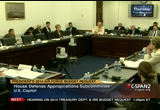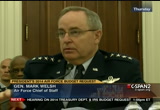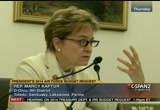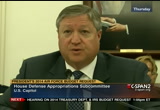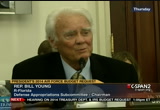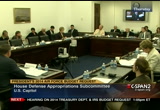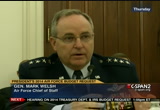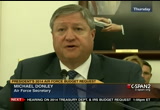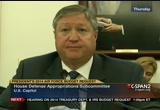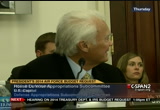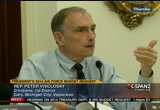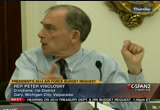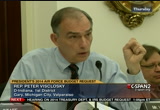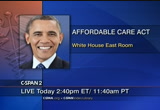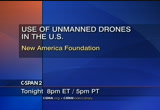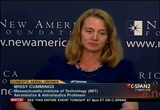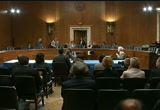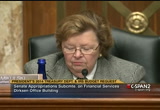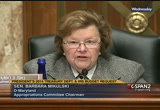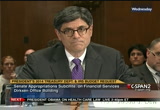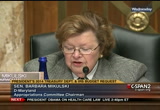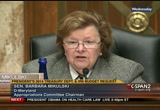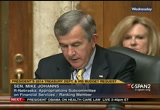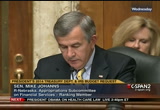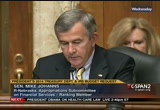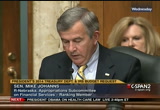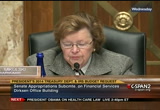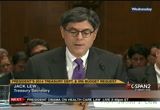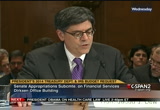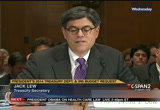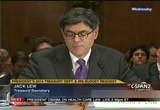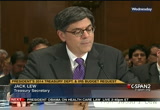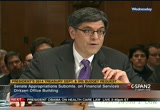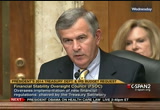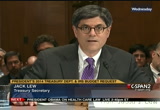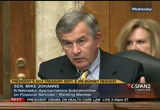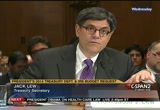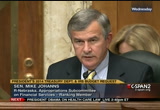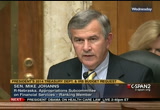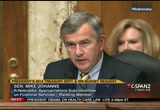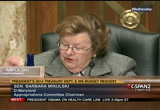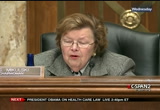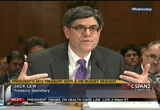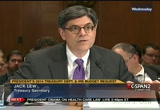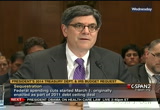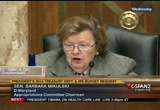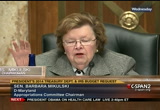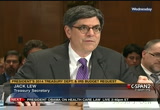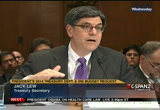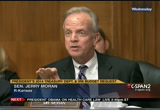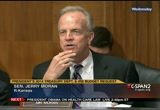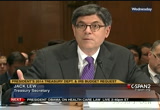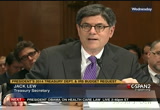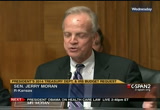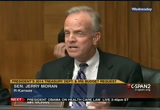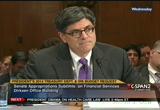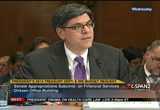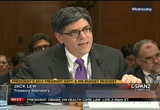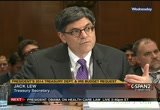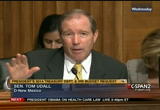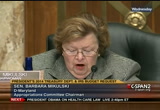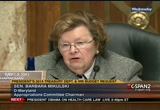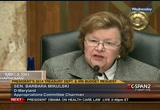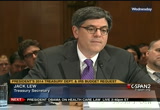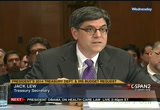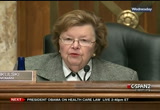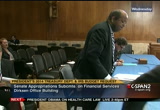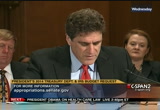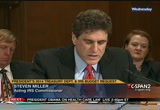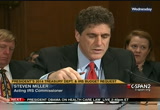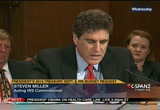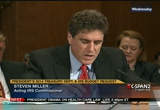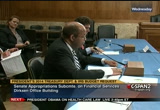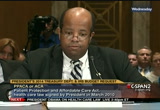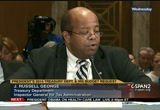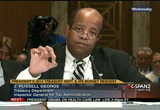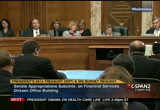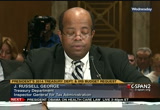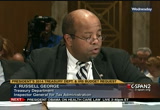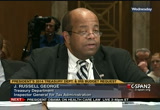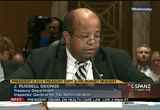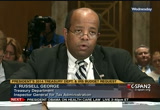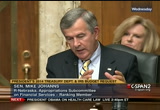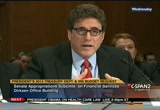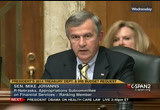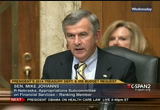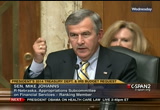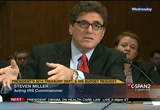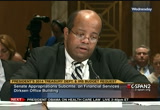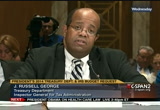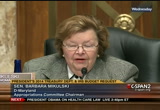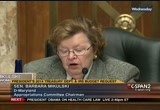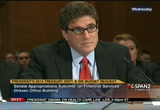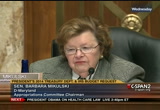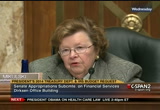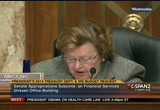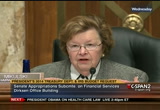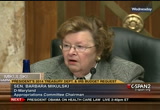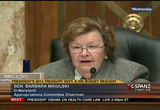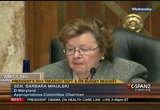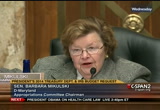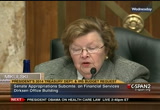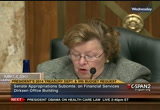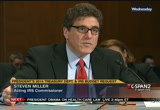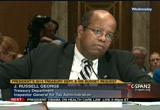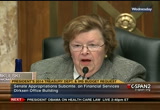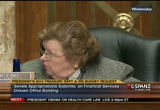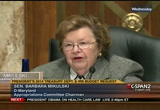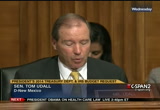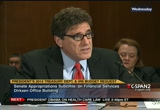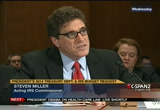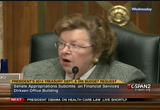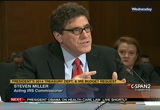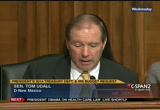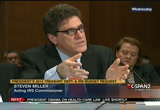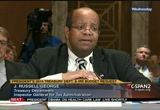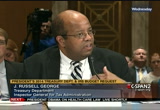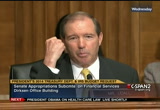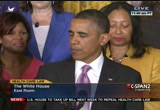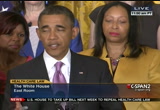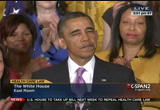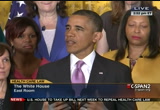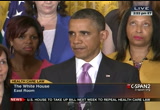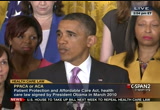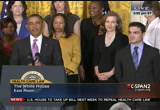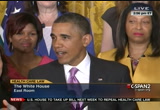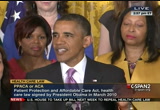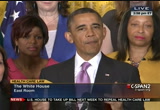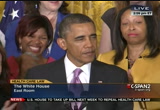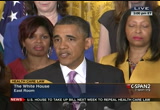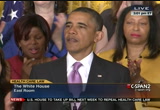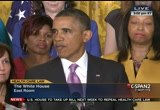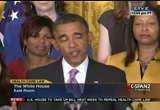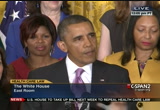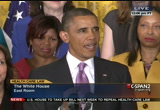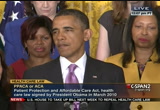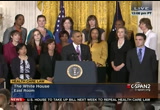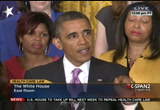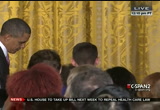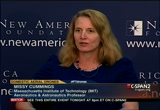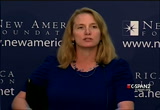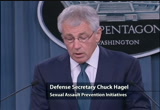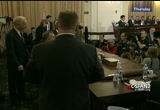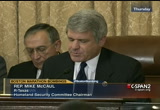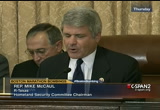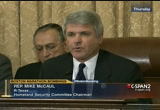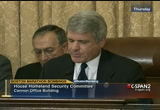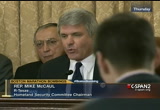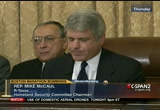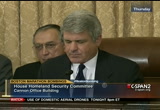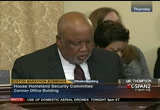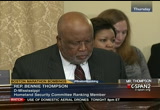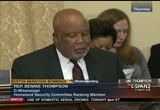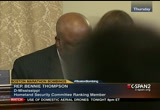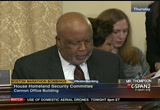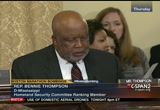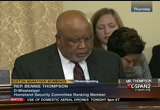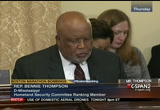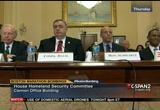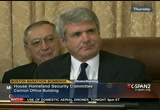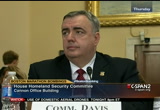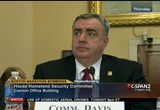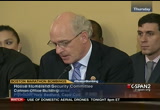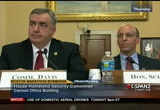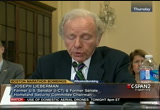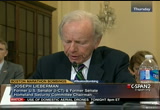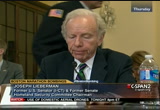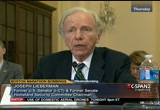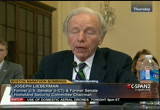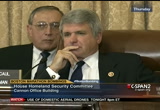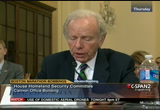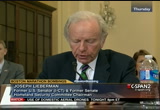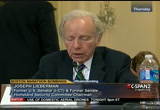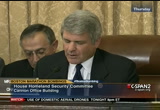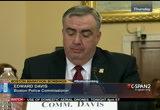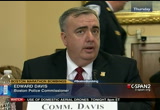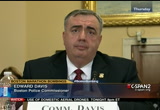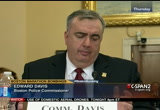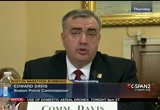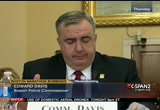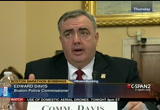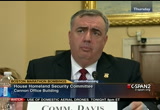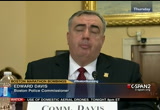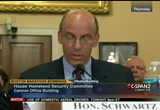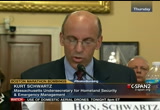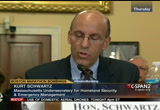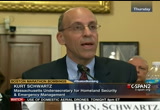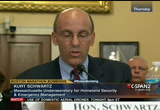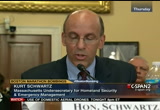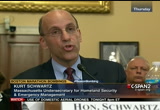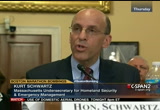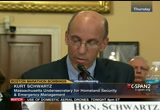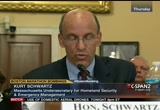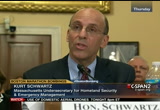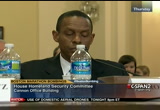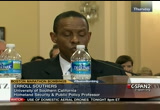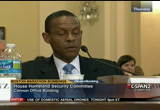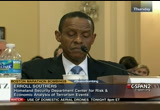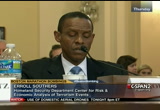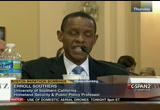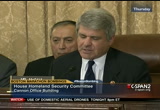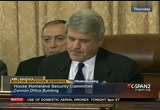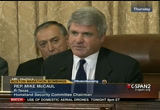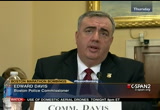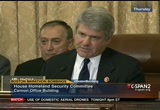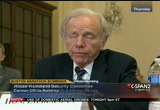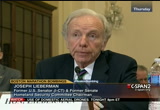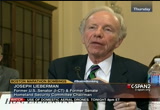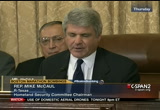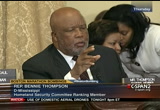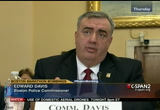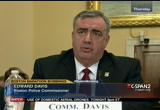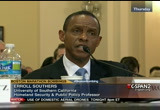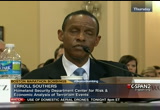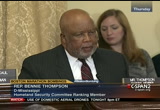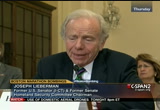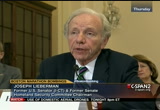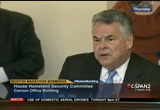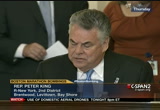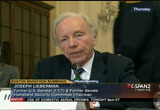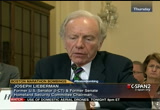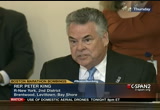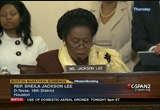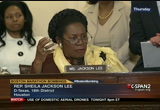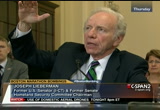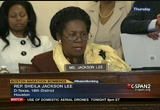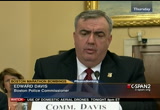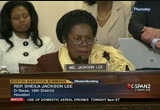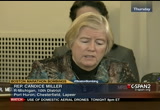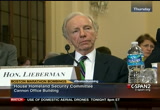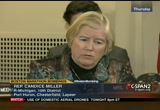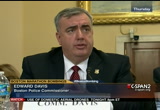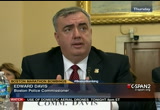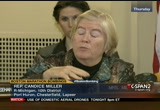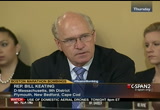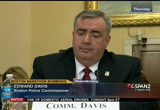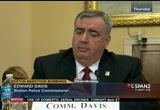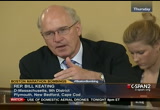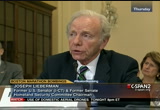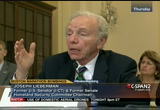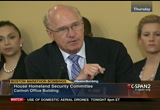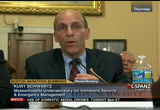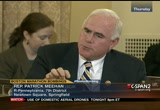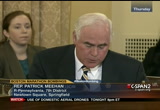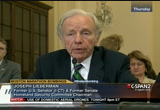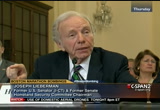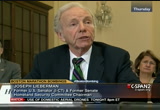tv U.S. Senate CSPAN May 10, 2013 12:00pm-5:01pm EDT
12:00 pm
12:01 pm
if there are things we can help we would like to be aware of that. thank you very much. >> thank you. >> thank you, mr. chairman. going back to north dakota for a moment, just for the record what proportion of the top 10% of the air force academy graduates are assigned to the specialty? do you know? >> i don't know the percentage. just to clarify the question top 10% come how many of those are assigned? i don't know the answer. >> could we get that for the record? >> yes, sir. >> thank you. what's the military occupation specialist selection process for officers? >> we've actually changed the process recently. we used to combine them. the intent and the pass was trying to provide a more diverse set of options for people who come into either driffield over
12:02 pm
time. they are related to use a lot of the same warning systems et cetera. the missions are interconnected in a meaningful way. what we found was we felt we needed more expertise at the mid-and senior levels. we are also starting people to live in developing expertise in the space you. then be catching up with their peers. so we split the two career field so now we'll have a missile force that is kind of going back to the past with the come in as missile officer they were broadening opportunities that they will grow within a missile driffield speed what percentage the of the airfield our officers working in a specialty? any idea of? >> we have, i don't know the exact% but there's about 40000 people working the nuclear business over all for us. the part of that is a small percentage. do you know the never? >> i do not know that. this is about 5% of the total air force resources in the nuclear enterprise.
12:03 pm
>> also want to talk of it is unmanned aircraft systems. i think it's been talked about i think mr. moran kind of mentioned it, the air force was slow in catching that technology, the on-demand vehicles came board. and i know that today certainly were trying to catch up. now we have this proliferation of unmanned aircraft systems throughout the dod that the air force doesn't necessarily patrol, the army or other agencies. but getting to the reapers for a second, air force has requested funds to purchase 12 m. nine reapers, fy '14 and i'm glad to see continued support for the program. but the efficient production as understanding is about 24 aircraft per year to maintain the lowest cost per unit. and i know there's budget
12:04 pm
considerations but the per unit cost obviously on those aircraft go up considerably. also want to talk about the training units which are critical to the air force, and these so called ftu's or costly requirements of personal costs. we have existing facilities and i understand in the air force is looking to expand their facilities throughout the united states. does it make more sense to use of existing facilities, existing capitalization you already have rather than expand these facilities to other locations? >> yes, sir. i know of no plans to expand reaper training in -- [inaudible] those are two training bases now. we continue to -- >> we understand that you're
12:05 pm
looking at expanding that beyond, versus the air guard beyond the california arizona north dakota texas and ohio. these existing aircraft that understand the in nine aircraft isn't going to be provided for those. our intent overtime is to place the in q1 to the maximum extent possible to the much more cable platform but we don't intend to stand up new flying training units in all those places. those are operational units. they're controlling aircraft are flying operational activities around the world but they will not be an additional training. >> all right thank you. >> ms. mccollum? >> thank you mr. chair. secretary donley, many have been
12:06 pm
saying this all week on the other side of the capitol and in the policy committee that military branch is in an assault crisis. and you know, we've been told over the years that you far that navy saw 32% increase in the last report that was published. marines had a 30% increase. air force had a 33% increase. the army showed only 16% -- issued a 16% decrease. so maybe the army has figured it out. maybe we should be paying for all these different programs, assault is assault, rape is rape. we're not tolerating it. so one of the things that i've been speaking to congresswoman granger, i wanted to get you before here, working with some of the other of our colleagues have been working on this and
12:07 pm
maybe on another special committee. this is going to stop. and to the air force you know your best just isn't good enough. when i was appointing young woman to the military academy 12 years ago i gave them my personal cell phone number. and said can you don't have to take this. you call me. i've got your back. you don't have to call your mother the you don't have to report to you call me. but all the women who are in my congressional district, and around the country who enlisted didn't have my cell phone number. they didn't have anybody tell them you don't have to tolerate this. so we have the air force academy standard. then we have lackland. and now we have what happened this week? so you talk about changing the
12:08 pm
culture, and everything from a "new york times" article march march 11. mr. hagel said he would review the decision i lieutenant general greg franklin, the commander of the third air force, to dismiss the sexual assault condition of lieutenant colonel james oracle. he couldn't even change it at the top? that a court martial would come down? that's pretty serious. and it got overturned. what did that say to women who actually did report and go all the way through as victims and what did that say to the jury what the tough job of really weighing the evidence and come down on one of their own? stroke of a pen. doesn't count. doesn't matter. so i've a question for you. the way i understand things, and i'm not an attorney, the air
12:09 pm
force spokesman confirmed the air force can bring its own case, irregardless of what arlington county doescome and god bless them for taking up the charge, but the secretary of the air force must approve a dual prosecution and cannot do so until after the case concludes. so that means if virginia finds him guilty, my question to you is, are you going to charge him? because the buck stops someplace someplace. >> it does come and in cases like this we will wait for the local jurisdiction to reach its conclusion and then we will figure out what the air force can and should proceed with separately. spent i did see if he was found guilty. so let's take it away from him.
12:10 pm
let's not talk about this case in particular. if civilian courts have the opportunity to pursue some of these, don't turn it over then it's going to be up to the secretary to say, if a court of law, if a jury found this person guilty, we are going to do the dual-track and hold them accountable as if they were a uniform member. i've said this before. this, you know, everybody is victimized by this. the woman has been assaulted or the man who's been assaulted are the primary victims. but everybody who wears the uniform, every veteran in this country is victimized by this. so, you encouraged us to a a hearing on this and we are wrapping up, and you spent, you, you know, i don't want to say you spent more time. we spent the the time when you discussing this but i have many, many other questions about this
12:11 pm
massive budget to talk about, but if we don't get this right, nothing we do with equipment matters. because we are saying you're not even safe to be listed in the united states military. and i spoke with military leaders that are here on the war college exchange, and they were asking me about this. and they are looking to us for leadership. so mr. chair and ms. granger appear to be interested in working on many of the special committee to either draft ready to go, i will share it with you and others today. mr. chair, whether we do with the joint policy committee, or something like this, i think enough time has been spent on this and the appropriations that go to this programs that don't work we have an oversight responsibility. and you've been very, very supportive of this and i look
12:12 pm
forward to the briefing or hearing in the upcoming months. thank you. >> thank you gentlelady. >> that you mr. chairman. in essence of time i do tend we may be voting in the next few minutes, i will associate my comments with mr. moran and others about, with all due respect, there are some additional questions that we have not gotten answers from. i will also shape my comments with mr. crenshaw about space launch and we have additional questions on that as well. i am going to ask the question because if something is so critically important, especially since we just lost one. and loss of the crew on the kc 135. before i go to i would like to ask, you're giving us information on ask the army yesterday for a record of potential assaults since 1992.
12:13 pm
if we could see to try to glean some additional information about whether there's a tendency when we are searching for whether we're drawing down or what some additional information, not just the last decade that we been in afghanistan and iraq, but really the last 20 years to try to get some additional information. so as we are trying to come up with some ideas, some constructive suggestions too maybe we can get something from that. i would like though to associate just one comment about sexual assault. mrs. grade mrs. mccallum, ms. kaptur, the chairman and the ranking member, many have spoken about this. but it does become personal because i'm going to be nominating one of my daughters very best friends, she's going to be appointed to the air force academy. i'm having dinner with her and her family on monday night.
12:14 pm
and i want to be able to look her parents in the eye and i want to be will to look her in the eye, and i want to let them know that the highest level the problems that we've been discussing, are not going to be ignored. it is so allah has been said and we look forward to working with you on this to ensure that this problem ceases. let me mention briefly about the tanker, because this is an important program, and certainly the secretary and the general said. mr. secretary, discrepancy between the contractors estimate and the current governments estimates have grown to about $500 million, even though the program is operating under a
12:15 pm
fixed price development contract, and the contract we understand will have to absorb overrun, does this committee have any reason to be concerned about the growing discrepancy? and secondly, have you made any significant engineering changes to the aircraft at this time? >> to answer your second question first, the answer is no. i'm required to sign report to congress on a regular basis on thisonthe subject, and it's been consistent over the last couple of years, no. no engine changes have been made. to the program. to which you refer to. it is true that the contractors the estimated completion is above the ceiling that we have set for the program, but it is a fixed price contract so the taxpayers exposure is limited at
12:16 pm
$4.9 billion. and anything above that is on the contractor. we know of no schedule concerns at this point from the program. and so far it seems to be on track. >> and we don't anticipate any additional issues as it relates to the sequestration having impact on getting the badly needed planes? >> the main thing for the air force is to make sure that the program stays funded, and at the levels necessary to support the contract that we've agreed to come and the schedule that we have agreed to. the air force has with the support of congress will be able to do that. >> mr. chairman, i will yield back if there are other members would like to take this up. >> mr. kroll. >> thank you, mr. chairman. gentlemen, thank you for your service. thank you for being here. i had not intended to say anything honestly about the sexual assault issue because i
12:17 pm
knew is going to be able to and fully covered by others. and probably more knowledgeably. but i do want to add one thing. my dad was a career noncommissioned officer in united states air force. my brother served very honorably in the vietnam era, in the air force. and my favorite first cousin in the world just retired after 20 odd years and in other states air force as a lieutenant colonel, and you know, served in both afghanistan and iraq. i know what kind of guys those three people are. and they wouldn't tolerate this. they would look on this and they do look on this as a reflection on them. they were very proud of their service and very proud to be associated with the air force. you know when you hear what ms. granger, ms. mccollum and my good friend from alabama, and other people have said they are speaking for those gentlemen to to. and i think ms. granger said
12:18 pm
congress would probably do something, it may not be the right thing but it will it will. so please take this -- i know both of you. look, i don't have any doubt about either one of you but you just cannot, we cannot collectively this committee cannot, this congress cannot allow this sort of behavior across the services, certainly not unique to the air force. you see it time and time again. it's got to change. i would suggest, i was impressed by what you said about your missile crew and the commander and the actions that he took. i mean some people need to either get kicked out or you need to do something. i mean i think we have too much judicial process here for perpetrators on not nearly enough for the victims. if there have to be some you know, some examples made then they just need to be made. because it's just not tolerable to be in this situation.
12:19 pm
i don't look for a response, but i know, again i don't doubt your sincerity and where you're coming from on this. >> i would like to just briefly respond. young men and women in our air force have been entrusted to the secretary and i. nobody, nobody cares more about this than we give. there is no magic that will solve this problem. is going to take a lot of hard work, a lot of new ideas, a lot of partnership with the congress on with outside agencies and experts to do with his. weirdwe can do much of that in all those areas as we can out i would be more than happy to discuss those details with any member would like to know more. but we understand the problem. we agree with everything you said. >> i appreciate that. and again i have a lot of confidence in the. my dad was actually join the old army air corps and lived through the immigration of the services. and he said it was the best thing that he ever so happen in his service.
12:20 pm
and he was always very proud of military for having led in that regard when the rest of the country was awful slow in dealing with this. this is that kind of situation, probably not fair to you but because it's not unique to the military service. we have this problem across the board. we are just thinking with the violence against women act. no and it happens a lot. but, you know, i guess because you guys, and ladies, are our brightest and our best we expect you to figure out a way. i think you will have incredible support, but you do end up being held to a higher standard than anybody else. he always comes to. i know you well again, but this one really is a big, big deal for the country i think it and long-term for the service because it is so counter to what the value structure of the men and women you know 99 out of 100 who they are, what they stand for.
12:21 pm
so anyway let me move to something else, if i may quickly. i want to ask some things about the civilian workforce, and in full disclosure, certainly you know i've got a very large workforce in my district at tinker air force base. and, obviously they're concerned about the furlough situation. i know you have to deal with this question. i am concerned and what your thoughts i don't we talked about this a little bit with the secretary who i admire tremendously, but he talked about well, we want to be fair to everybody. i understand that too, i don't think i'll civilian work is of comparable importance and quality as you wrestle with it. and particularly, my good friend from alabama talked about tenure. we maintain the kc-135 fully. my dad spent 20 years he spent several years working on them in the late '50s and early '50s. as our president and they're
12:22 pm
still coming through. these are 50 year old airplanes in most cases. and we do, they are funded differently. that air force is on the out of the working capital forced to i would just add, as you wrestle with this tough problem, it wasn't of your making, please focus on making sure that those maintained, that is aircraft get the kind of attention that they need. i wish we didn't have a 50 year-old tanker fleet to we're awful proud we can keep planes that age going in combat conditions, it tells you something about the quality of the workforce, both uniformed and nonuniform out there at that installation. they are remarkable people in terms of what they accomplished. what are you doing again if all things are not equal it just makes value judgments here as to what you keep going just to make sure we don't have accidents and we don't have lost capability?
12:23 pm
>> well, mr. cole, first of all the decision on civilian furlough has not been yet made. it's at the secretaries level. he's in the process of making that decision. we have had extensive discussion in the department about the issues that you have raised. we already know that there's impact on weapons systems sustainment from sequestration, and there's an impact already to which i referred, which involves the delay and creation of a backlog, if you will, in repair for probably six aircraft and 35 engines, is roughly the current estimate. but this is complex work so we know that there is an impact on interactions and on weapons systems sustainment from that. there is the issue of the working capital fund and its fiscal health and how to keep it solvent through this period. and then there is the additional
12:24 pm
issue of the civilian workforce management challenges on top of that. the issue of furloughs and how that will be. so those three things weapon systems, sustained, working capital fund furloughs, are being addressed collectively and we're doing our best to minimize the impacts and to maximize the readiness that we can get out of our dental workforce with the funds available. >> again, i know that you are and appreciate the fact that those furloughs came down seven days. i'm not doing anything i can tell the secretary of defense, i would hope again it is admiral to want to be perfectly fair and treat every employee the same way. but i think where we can particularly if there's an issue of safety and maintenance of assets here that some discrimination might be
12:25 pm
appropriate. in making sure. so i know you'll continue to work to try to minimize those furlough days. i know this committee didn't like sequestration anymore any more than you did. i think most of this committee would hope we can arrive at some larger deal, and i suspect people on both sides of the aisle around this are the kind people tend to vote for things like that to make them happen. but again, we have given you a tough task. please give it a lot of care and attention because i don't want the airplanes that don't fly let alone airplanes that come down with cruise in them. and we want to give maintain those assets with the kind of work it takes to do it. thank you very much. thank you, mr. chairman. you've been very generous. >> thank you, mr. cole. before yield, i will just say the vote that is on presently is the camp amendment. then they will be following that vote that will be 10 minutes of debate on the motion to
12:26 pm
recommit. then the next vote will be on the motion to recommit. then the third vote will be final passage which will be a five minute boat and then the possible of a fourth vote approval of the journal, and mr. owens, i'm happy to yield to you now, sir. >> thank you very much, mr. chairman. i wish ms. mccollum was here. as a former jag officer it's my understanding at least the rags when i was on active duty, provided the event of a conviction of lieutenant colonel that he would be subject to an administrative discharge proceeding. and i think it was unfortunate wind that discussion was going on but that wasn't shared with there. i think it may have given her some further basis for understanding the process that you're going through relative to the potential for doing prosecution versus allowing the
12:27 pm
prosecution to proceed in the civil arena followed by an administrative action in the military. so it is my understanding -- to those rules still exist? >> i believe they do. >> and depending upon the degree of the conviction, misdemeanor felony, that would move, that is a potential that you could move to eliminate that officer from the military? >> well, that is the decision that would be initially looked at by the wing commander who supervises him and has ucmj responsibility in his chain. that's the 11th wing, and they're getting legal counsel of course, and we will let that process play out. >> thank you. now to the business actually at hand. i've taken a look at her budget requests. it's very clear when you look at this that you are looking for a
12:28 pm
relatively marginal increase, about 2%. however, sequestration continues into the next year, the next fiscal year. in effect you will have a further reduction. and my question is, have you established a prioritization of actions that you will take to meet sequestration? so that you are starting him if you will, with a list and crossing them off as dollars are eliminated. is that a process you've gone through? >> sir, we are deeply enmeshed in the process in the department of defense right now. and it is consuming a lot of time and attention. there is no set i would say we understand the requirements of the budget control act and the potential that sequestration might continue. we still hope that the congress and the president might reach an agreement to change the budget
12:29 pm
control act. >> so do i. >> to relieve us from the burdens of sequestration which are on the books now. but we are going through multiple budget alternatives, internal for the department to assess the impacts going forward and to prioritize our work absolutely. >> and are you looking, if you will, through a broad brush are you looking a personal? are you looking at equipment? are you looking at -- >> we are looking at everything. the secretary, as you know right after he came in and established a strategic choices in management review what is referred to in the department as skimmer, which is essentially a 75 day review top to bottom on strategic fiscal resourcing issues, on all the matters that
12:30 pm
12:31 pm
affected. nothing will be protected. so it will affect the force structure. it will affect the rate of modernization as i described for the air force. all of our military forces will be smaller. we'll have less capacity. it is my hope that we would be a ready force even if we're smaller but that can not be guaranteed at these levels reductions. so i'm just saying a trillion dollars is going to have a huge impact on our military. >> thank you. i yield back. >> thank you mr. owens. mr. womack, thank you for your patience. >> thank you mr. chairman and my thanks to secretary donley and wish you well when your tenure as secretary is over. and general welch as always good to see you. and as the secretary said it's been a long time ago that he said this we've covered a lot of material here but i want to associate
12:32 pm
myself with his remarks about regular order and i think that's one of the true challenges facing this congress. i know there's a lot of things that are challenging our defense department and the services but we have to get back to regular order and i couldn't agree more and i appreciate you so much saying that in your opening comments. i also mr. chairman want to associate myself with remarks that have already been provided regarding the critical issue of sexual assault and going on within our services and i know it's been a difficult issue. i think mr. cole said it pretty well when he said that he had the absolute confidence in the leadership of the air force to deal with this issue and but it obviously is something that
12:33 pm
has spiraled somewhat out of control and and general welsh, i would just challenge you as the new chief of staff of the air force to call on your days as the commandant at the air force academy where you had the future leadership of the air force many of those men and women now moving through the ranks as officers in our air force call on those days when you were dealing with leadership issues there and because this is a true leadership issue for our department of defense and but i have confidence as mr. cole has said that we'll get to the that we'll find the answers and the solutions to the challenge. mr. secretary. >> sir i would just like to make sure the committee is aware of how much work that the chief has put into this matter. it has been of growing
12:34 pm
concern to our military leadership. it was subject that came up in the chief's confirmation hearing. it is one that he has focused on absolutely since day one and one of his first acts was to bring in all the wing commanders from across the air force for a focused day and a half discussion on this issue. every wing commander in the united states air force was there to hear and understand the importance of this issue to the chief and to our air force leadership. and the expectations from them as commanders for not only good order and discipline but a unit climate that promotes the dignity and respect of every airman and respect for the work that every airman brings to their job. and so i think we have a chief that understands this and is working it very, very hard. >> i look forward to the results. i have a couple of
12:35 pm
questions. one is somewhat parochial in nature and but as general welsh knows the one of the airbases that has one of the national guard airbases has been remixed in fort smith, arkansas in my district and i know there was a line of questioning that came up recently in a senate hearing and general welsh, i will just give you an opportunity to for the record to help me reassure the record there that the remixing into the remote split operational platform for the 188th at fort smith arkansas is still still the plan and that the appropriate steps are being taken to insure that the proper budgets and what have you are in place to insure it has i guess what we call initial operating capacity. just a thought or two on
12:36 pm
that. >> thank you congressman. the plans are still in place. we the plan is to start drawing down the a-10 unit at north smith. that will be two aircraft a month until summer of 2014. in the springs of 2014 we'll start to move people who are interested from the a-10 unit to the new targeting squadron that will stand up at fort smith and we'll look for training opportunities in the mq-9 because the intent is to have initial operational capability of the squad first quarter of 201 of that is the plan we're working on and we're working the budgetary issues that go along with that. >> is it your initial opinion that these kinds of missions are the most enduring we have in the force right now? >> sir, i don't know about most an during over time but clearly this is the leading edge of what our combatant commanders expect from our air force is intelligence
12:37 pm
surveillance and reconnaissance support and that's what these units do. the targeting group can work both in that arena and the cyber arena both which are clearly growth areas for the future in our air force. >> my last question is about the total force task force. in the testimony it was on or about march 1st that that task force was stood up. are there and having been involved in i'm sorry mr. chairman. the having been involved in military planning throughout my military career i know that anytime we look into future planning for these kinds of issues that many times we we introduce into the equation certain facts or assumptions that may be in play necial guidance, if you will for the people that will be coming out with these kinds of reports. what kind of facts and assumptions have we made as we start looking at the proper force mix over the
12:38 pm
next decade or so? mr. secretary you might this may be the or the chief either one. >> sir our total force task force has been working for the last several months as you know in consultation with a couple of the great tags from around the country who are helping oversee the activity and offering suggestions on approaches. the next step for the total force task force is to come together here next week. i believe the first input is tomorrow afternoon and then next week we'll sit down and they will give me their latest update what they see as owe pongs models for the force mix. should it be a percentage by mission? ore should it be percentage by overall force structure? is it better to put missions in the guard versus missions in the active component? we'll look at that model first. we have done a lot of analysis behind it. and we know the operational effectiveness drivers and we'll sit down to talk through the options. the best part of this discussion before is honesty.
12:39 pm
all the them are on the table. we have been able to kill many of them. we've been able to agree what components see as the problem versus what they don't agree to as the problem and we'll now start to dissect those things. the total force task force will be our principle point of contact and information generating advice offering if it is requested body for the senate's air force force structure task force that is standing up about right now as well. so lots of activity going on in this area. the intent is to streamline it with our budget planning process so in the 15 budget proposal how the we plan to move forward. >> mr. secretary. >> the chief is right on top of it. i would just add as we go forward, and potentially as the services including the air force potentially get smaller depending on the budget outcomes we're destinned to work more closely together and this is already recognized across our forces. we've made bed-downs for the
12:40 pm
joint strike fighter and as we've made the plan bed-downs for the kc-46 tanker there are associate units planned for all of these locations. so tighter integration between the guard the reserve and the active components at critical locations around the country is going to be more and more important to insuring that we have a ready a ready force and the most capable force we can generate across the total force not just active or not just guard but working together as a total force. that's where we're focused. give us the most efficient but the most effective combination of forces and try to do that as efficiently as possible around key key locations. >> thank you gentleman. thank you for your service. >> mr. chairman. >> miss kaptor. >> thank you mr. chairman
12:41 pm
for your service to our country at a most trying time for the nation and for the air force. i wanted to say something to you that i said to navy and to army and that is in terms of the personnel now enlisting in our services based on behavioral studies we have done. we know a much higher percentage of those who are prone to violence because they have experienced violence in their own lives with a volunteer military are enlisting in the services. in addition to the behavioral work done to try to address the sexual assaults and other issues woe deal with inside the military during deployment and post-deployment i could encourage to look at preservice screening that looks at the violence question because it expresses itself in many forms as individuals attempt to carry forward with the tasks that the nation asking them to do. that is the only in the way after suggestion. number two i wanted to ask and associating my remarks
12:42 pm
with congresswoman mccolumn and mr. granger and mr. bonner and so forth what can we as members say to our constituents are immediate actions you have taken as air force? is there any individual out there who had attended the air force academy and left because of sexual assault or believes that this has occurred today within the ranks? is there a hotline we can tell them to go to? is there some person they should report this information to? what can we do because we will be asked. we are asked in our districts. what has air force done to create a special place for people can now take these concerns? >> there is a special sexual assault response coordinator at every air force location. so individuals who think they're, want to report or need to report either a recent or past event can do so through that channel. they can do that through their inspector general.
12:43 pm
>> mr. secretary -- >> do that through the command chain. >> i hear what you're saying there. i know when we ran into the problem with ptsd way back when people didn't believe there was anything or agent orange we create ad special place. we created another platform within the department of veterans' affairs within the dod i would ask you to consider structurally someplace where if congresswoman coleman or i or somebody wanted to allow information to come forward to you that there is a special place. if you could think about that. if you could get back to us i certainly 1-800 number people could call that would be it is at that level of public concern. i can tell you i had a young woman i appointed years ago to the air force academy and was beaten up and went through all the processes that existed at that time and it really changed the way i looked at the academies forever and i'm
12:44 pm
surely not the only member that has experienced that. so i would like to see your personal involvement at some level at the secretary's level. because it's that serious. so think about that if you could get back to me on that. my third question third comment relates to energy independence. thank you, general for mentioning in your testimony i would be very interested in more detail from air force as to how you have where your focus has been in terms of fuel consumption base powering r&d so that we can exceed the standards that have been adopted. you have already exceeded them on an annual basis but air force is the largest user of fuel in the military and any additional detail you could proside -- provide
12:45 pm
so i could see how you move toward air force energy independence and help the nation get there too i would appreciate more detail. now i wanted to move and associate myself with the remarks of kong man -- congressman felinghausen i find that what happened at minot inconceivable. i'm wondering there has been statements in the press regarding various individuals in charge calling the situation a crisis. the grade level was d in terms of oversight. general, you used the term in one article turmoil in the ranks. what can you do to assure us and assure the american people that this situation has been dealt with aggressively and that our missile capability is being properly shepherded and
12:46 pm
confidence restored? >> congresswoman, that phrase is not one that i have used so it may have been in the press but just so you know that is not a quote from me. to my recollection at all. >> perhaps it is colonel foles but i thought was attributed to my. >> most of the comments in the press have been from an e-mail colonel foles wrote. it is passionate e-mail. as i mentioned there was terminology i would use differently. if he was here he would tell you he would use it differently as well but the bottom line of this was i think the only thing we can tell the american people because this is the fact that there was an indication of a problem highlighted by an inspection that is there to do exactly that. and the leadership team took aggressive action to insure that the standard never slipped below the minimum required to get the job done in any area. >> is that what d congresswoman. the standard is very high. but it is unusual that this
12:47 pm
particular area would be graded that low. that's why the wing commander reacted way he did. and he reacted that way immediately. there is nothing good about the fact that this happened. the response was appropriate in my view and in fact i would be more upset if they hadn't responded this way. >> are people burned out? >> i don't know what these 17 people are thinking. i don't get that impression from the commanders there i talked to a number of air force commanders the global strike commander. their belief is this is just a matter of refocusing the workforce on the standard expected every single day in their job. that is the way they characterize it to me. i can understand that. this is a difficult job. congresswoman alluded to that it's a tough job. you have to be focused. there is no room for error and certainly no room for commanders accepting less than expected performance and i think that is why they took this action. >> what about the term used rot, rot r o t?
12:48 pm
>> the term rot was again used by the same individual in an e-mail. the view of his commanders is that he was trying to get the attention of the workforce in a way they could not, would not avoid paying attention. he was very passionate about the fact that he wants his team to perform better than they have done. >> have you replaced members of the team? >> all members of the team that he was referring to have now been decertified. they're going through a 6 o-day retraining program. and they will reearn the right to go back in the mission area or not. i'm confident that they won't go back in if they don't meet the required standard and expectations. >> hough long did you when the evaluation was done did you react immediately? >> the wing took action immediately. we were told we hear about the inspection results within a 24 hours of the inspection being completed. we get a report the secretary and i both as do
12:49 pm
the commanders in the chain above the wing the air force global strike commander told me immediately after this occurred that the wing was taking action to look into the grade. they were concerned with that kind of a score on their inspection report. so we knew this was going on. >> in terms of what occurred at that site was that alert you to attention you should pay to any other sites? >> yes, ma'am. they shared reports and lessons learned across all -- >> will the gentlewoman yield? >> i yield to the gentlelady. >> when did general haig gel found out about it? he asked about a report of something that had been open sourced. because there had been problems here once before one would assume after a problem was identified and reported as the commander did at that base that something that would be, you know another black eye on the same unit that with potential for high-profile the secretary would be informed in person. when did the secretary find out about this. >> congresswoman i tell you
12:50 pm
what i found out secretary donley found out. if he knows when secretary hagel heard. the grade on the report we knew about immediately after the inspection concluded. i don't consider that a black eye. it was a passing grade for the unit. there was corrective action required in the mind of the commander and they took it. we knew that wasre quoting from we became aware of this past friday evening. and then on monday morning we became aware that they had taken the 17 officers at the end of their review and put them into this grounding status. so we found out on monday of this week. i don't know when secdef was informed. >> may i ask how often are these inspections done? >> this particular inspection is done every two years but there are three major inspections on two year rotating cycles and they overlap. they get at least one major inspection every year. >> i think both congressman friehling highsen will have
12:51 pm
questions for the record as well. i have to tell you this is astounding development. i know my time is up mr. chairman. i wanted to ask if the secretary or the general could provide for the record on another topic. how you are looking at sequestration and cost savings over the next five years, transferring some of the active duty responsibilityies to air guard and reserve forces. how is that influencing your thinking in order to meet budget requirements as you look at air force futuring of air force. very interested in the enhanced role of the guard and reserve in the years ahead as a way of meeting our mission but also saving money. thank you very much. thank you for your testimony. thanks mr. chairman.
12:52 pm
>> mr. secretary early in your comments you talked about the issue of basing in europe. we're hearing conversations about another round of brac who has owner ship in a place like lodges? >> i will ask the chief to speak to these issues as well since he was our former commander of us air forces in europe but is in this to answer your question directly logis is under usaf's command. >> not necessarily is there an air force presence but you are not the owner of the presence there? >> the air force is. >> oh the air force is? >> it is a portuguese base as well. >> i understand that. also the conversation i'm
12:53 pm
hearing from a number about our colleagues as well as some of our friends in portugal that they're concerned that we might be diminishing our reducing our footprint to the fact it might not be a good investment for them and they may be looking around for a different tenant. we understand that the chinese have been present there without any real knowledge of what they were doing but we understand that it has been a substantial chinese presence be leaving a major presence there? i understand we would retain some presence but it looks to me like this is a tremendously valuable facility right at out there in the ocean that has a commanding presence in europe africa and i'm just i'm just wondering if we're if we are seriously considering just basically
12:54 pm
moving out except for a small presence? >> well, i just i'll let the chief amplify but we do plan on reducing our footprint at logis and cutting back on the hours. we're not talking about departing logis all together but reducing the hours of operation at that location. chief? >> chairman in response to congressional interest in looking overseas force structure as well as department of defense response to that interest us air forces in europe and other components in europe along with u.s. european command looked at all basing installations for options for closure realignment and anything we can do to save money on infrastructure in europe. we consider that precursor to congress thinking about that in the states where we think we have excess capacity as well. as part of that there is operational assessment done of utility of every installation and all the us air force's installations
12:55 pm
logis is has no immediately operational requirement to support activity in the middle east or africa. the changes and ranges of airplanes and types of planes we move across the ocean we do not use the facility at anywhere the rates we did 10 15 or 20 years ago. the intent to downsize from airbase wing to airbase squadron. to be resident on the facility and maintain custody of the fuel facility there which is very large and is a strategic asset for the united states. but other than that there is no operational requirement that drives continued large-scale investment in logis and as the secretary said if we're talking a trillion dollars it has to come from somewhere, sir. this is a tough decision. >> i think what i'm wondering about, if there did become a operational requirement for something like logis how what would we replace logis with? don't have enough aircraft carriers. >> i think usaf is doing
12:56 pm
excellent job planning for the future and in some of these contingency locations where we have not been utilizing the our forces and our presence there as much as we did 10 15 or 20 years ago, it makes sense to cut back. but we still think we will have access to locations like logis and other parts of europe, if we maintain a residual presence there and we're doing that at logis this has been a matter of great focus an a lot of work on the part of the defense department and state department leadership over the last few years. obviously it is a matter of concern of local residents on tesaria the island and inside of. we have had a number
12:57 pm
conversations a number of times. i talked to their minister of defense on these issues. it is a ongoing dialogue and the portuguese want to be good and effective partners in nato as they are. >> sir are we pretty con vinced that our presence our influence or our control there will not be replaced by some other foreign interest reducing our activity there? >> i can't speak to what the portuguese government plans might be for that base going forward. that has not been a matter of on my plate. >> seems like an awfully good asset. having had a chance to visit there a number of times it is an impressive location and an impressive capability. but anyway the next -- okay. the next series of votes
12:58 pm
will come really quick. there will be three votes and five-minute votes and so we're getting fairly close and we're going unless mccluskey is. say again? okay. i'm just advised that the bells have just rung for the votes. you have the final time. >> mr. secretary-general, i guess relative, to the issue of sexual misconduct i would urge persistence. i can't imagine how many distractions you have at a given moment given the budgetary concerns that you have given the responsibilities you have. and i would urge persistence for those recruits. for those sergeants for
12:59 pm
those. in another century when i started practicing law, it was against the law to drive a car drunk. but it happened. it was kind of acceptable. and not much happened to you when you went to court if you had a conviction. but persistence paid off and people understand, you could hurt yourself you could hurt somebody else. and would urge persistence. just every day so people know nothing's going to let up until that culture is changed. secondly would associate myself with mr. frelinghusen's concerns also echoed by miss capture that the -- kaptur that the issue of nuclear weapons is probably the most critical moment in our military. . .
1:00 pm
1:01 pm
nuclear weapons council adopted a long-term strategy to take seven ballistic systems and reduce them to essentially three ballistic and the two air delivered. whether you are in concurrence with that and whether again you might have cost concerns relative to the airport, the you have strategic reports on a common warhead on the cost issues involved? and finally because it is all the human condition if you could point out any improvements or changes you would like to see relative to your reaction of mnsa because the strategy weapons stockpile but that there is good communication going on between this service in the
1:02 pm
1:03 pm
>> i am considered a traitor by many people in my community and dennis patrick smith on salon.com he chases me around to harass me about trying to put a commercial pilot out of work. they announced that in 40 years all of the fighters would be in israel. that is a bold claim when one countries as we are going to replace everything.
1:04 pm
i flew a fighter and i can land a plane on a carrier by myself. the computer always lands aircraft better on the carrier can by itself. the computer doesn't get tired and have a ramp strike at 3 a.m.. the computer puts the bomb or the weapon on the target it suppose to and it doesn't make mistakes. i know there's been a lot of concern in this room about carbonizing -- weaponizing and we need to revisit our policies on any platform, but i am here to tell you as a fighter pilot humans make so many more mistakes at the tip of the sphere in the cockpit with trying to drop bombs where you actually have a group of people along with the lawyers sitting
1:05 pm
with you trying to make the hard decisions is a better form of warfare than the kind i thought so even though we are here and scared of the uav in terms of what lies and then i will tell you doing so we have saved a lot of lives. >> treasury secretary jack lew and stephen miller testified before a senate appropriations subcommittee on the department's 2014 budget request and the impact of automatic spending cuts of their employees and operations. they were joined by russell georgia and inspector general for tax administration at the treasury department. this hearing chaired by the full appropriations chair barber of mikulski of maryland in a place of frank lautenberg.
1:06 pm
>> that afternoon, everybody. the subcommittee on financial services and the general government will come to order. today the hearing will be about the department of treasury's request for the fiscal 14 appropriations come and we will also here and take testimony for acting director mr. miller from the internal revenue service and we will also be listening to the ig for the department of treasury to give ideas and recommendations on how we can improve the functioning of the government to avoid any boondoggles particularly in the area of technology and we will talk about not only the best ways to correct money but also to make sure we get a sense of
1:07 pm
frugality on how we spend the money. so we look forward to that. for the german lautenberg, senator lautenberg is the chairman of the full committee and he wants everyone to know that he is eager to begin work on this new bill. he couldn't be with us today, and rather than the perfect the enemy with the good of senator lautenberg shared with himself i said i would move this committee for word i would like to think he was the ranking member for your courtesy here and i also know you have to leave so we are going to defer to you on some of the early bird questioning and function on a bipartisan way. we will have two panels as i said with both the secretary of the treasury and focus on the irs. the treasury department's largest bureau and the irs accounts for half of the
1:08 pm
subcommittee funding we are so pleased secretary could join us serving on a new rule a crucial role in this very important time in our economy. as to tours of duty as the omb director, the importance of the process to create traditions that generate jobs today and grow our economy that's why i support the president's budget level of 1.5 trillion, the same that we agreed to in the american tax payer relief act that we past ten years ago. we know that there will be a difference of opinion with the house who is marking out the ryan budget of $906 billion. there are going to be issues in
1:09 pm
their so what does the treasury need, and what is it that we need? this book this week as public service recognition week where we support public employees for their tireless work. the treasury staff are on the job providing value for the taxpayers. they do things like sanctions, new sanctioned experts at the office of foreign asset control target sources of financing is to disrupt iran's pursuit of weapon and destruction. the intelligence analyst the financial times enforcement network and they follow the financial paper trail to make sure the crime doesn't pay for financing organized crime or dmarko traffickers. they are the payment specialists at the f ns service that insures the social benefits get to the seniors and tax payers get their refunds and benefits go to our
1:10 pm
disabled veterans. we could go through agency after agency come and these agencies are on the job serving america's putative i am deeply troubled about all of the sequester and i am interested in the impact of the sequester both on the functioning of the depressed treasury come and we will look to you for your commentary about it. i have heard first hand because i have more class treasury department in my state from the irs to the fms and other important agencies. but we are also interested in what is the impact of the sequester as you see in our economy and the failure to get our budget cleared so that we can keep our economy on track. so we look forward to your commentary and i would like to turn to senator yo johan for any comments that he may have to the
1:11 pm
estimate my comments would be relatively brief because as indicated i have to move on and about an hour but i did want to offer some opening comments to all of the witnesses who are here today, we appreciate your attendance. today marks my first hearing as the ranking member of the financial services and general government subcommittee. i do appreciate the opportunity to serve on the appropriations committee given its important role in providing oversight over the discretionary spending. as we begin the review of the president's budget for fiscal year 2014 i will note that i am pleased i am glad the president acknowledged that two important entitlement programs social security and medicare are in trouble and must be strengthened. to his credit, he has proposed adjusting the formula that is
1:12 pm
used to calculate social security and medicare cost of living adjustments more accurately reflecting inflation rates but that is just part of the equation. i am disappointed this budget doesn't make the necessary strides to address the nation's debt. unfortunately the budget's move towards entitlement reform is overtaken by increased spending with higher taxes, and additionally, the president's budget calls for dismantling of the bipartisan spending reductions he signed into law as part of the 2011 budget control act. this would leave less than $10 billion of annual deficit reduction compared to this year's projected deficit of 845 billion. so the task before us is significant if not enormous. if the president really wants to stimulate the economy i would
1:13 pm
recommend that he reverse his record of increased spending and taxes. it just seems straightforward to me as a mayor council member, commissioner of the local member and governor that money left at home with hard-working americans means more money exchanging hands on the main street. we have to reduce the deficit and forge a path to the balanced budget. to make any real progress towards reducing the government spending and ensuring the solvency of medicare, we all must engage in a serious discussion about how to put entitlement programs on a sustainable path not only for my generation, but for the generation behind us. my hope is that the president's recognition of the unsustainable path of our entitlements is only a first step, one that will be followed by additional meaningful proposals in leader.
1:14 pm
they are willing partners. i, myself, and a member of the group of eight senators that have been working for a long time on coming up with ideas to deal with the budget issues. as a member of this committee and the senate i will continue my efforts to do all i can to be a part of the approach to balance the budget on spending. we do need to repeal the costly mandates and taxes and increased regulatory transparency and accountability. we do sell through the tax code that recognizes hard work and achievement are worthy of the reward, not penalty, and by making difficult decisions necessary to put the country on the path to longer-term financial certain security.
1:15 pm
members of the committee and the subcommittee to address the mounting financial issues and promote a stronger economy for the nation. thank you, madame chair. new to the appropriations excellent experience in the house and with our colleague senator moran. i would suggest we go to the treasury secretary and i can change the schedule. the senator has to leave, the secretary lew had to readjust. how much would you like to include in the questions as we proceed. mr. lew, i'm going to have you testified. i will go to you in case you have to leave we can hold down
1:16 pm
the fort and then i will go to my question. members of the committee i appreciate this opportunity in the treasury budget. i would like to think that the part of the treasury. they are thoughtful, dedicated, focused. the goal is to further the mission of the department and the american people. it's my honor to work with them and i would like to begin with an overview on the economy and get into the treasury budget. our economy is much stronger today than was four years ago but we still need to continue on the policies the will help create jobs and accelerate growth. since 2009 the economy has expanded for 15 consecutive quarters and employers added
1:17 pm
6.8 million jobs. the housing market is approved. consumer spending, business investment is solid and exports have expanded. the tough challenges were made. families across the country are still struggling to rid of unemployment remains high and the economic growth needs to be faster. we've need to put the house in order. same time the political gridlock in washington continues to generate headwind some putting indiscriminate spending cuts on the sequester that would be a drag on the economy in the months ahead if they are not replaced in the sensible deficit reduction policies. the president laid out a strategy to address the challenges in the path forward and replaces the sequestration and takes a balanced approach to restore the long-term fiscal health and makes important investment and manufacturing infrastructure training. these are critical and will help grow the economy and create jobs now and into the future. as i was in cleveland yesterday visiting with business owners and manufacturing workers and
1:18 pm
it's clear the american people want us to focus our economic policies on growth and jobs. now as the budget today demonstrates the treasury hopes to shape and implement the economic policies from streamlined tax system and reforming the financial system to securing our interest abroad and increasing lending for small businesses at home and whether it is making social security payments or producing the nation's currency treasury touches the lives of almost every american. while the responsibilities are extensive we are committed to meeting our obligations as efficiently as possible and the lowest cost to the taxpayer. over the last four years the treasury has made enormous progress to make the department leni and more efficient and we build on that momentum identify and nearly $400 million of additional savings. in the budget we bring out wasteful spending and consolidate redundant programs and cut the travel costs and sharply reduce expenses. we use materials more effectively at the printing we save on rent in the era of fiscal services.
1:19 pm
we continue to cut down on paper and paper work. in total be reduced by 3.3% when you exclude the irs and compare the budget to was provided in the past fiscal year. the irs is the main area we are requesting an increase. these additional resources well with the program integrity capper adjustment allow the irs to improve enforcement. with the new funding they will crack down on those who are obeying all and bringing in more revenue. for every dollar we spend on the interest of initiatives we expect to collect $6 of revenue. the request for the increase also includes additional funding so the irs can meet its responsibility which lowers the forecast budget deficit by more than a trillion dollars over the next two decades. the affordable care act is helping to slow the growth of health care costs and continued implementation of the affordable care act will help to improve the efficiency of the health care system. in order for them to carry out its obligations as mandated by
1:20 pm
the congress and health care of all it needs the appropriate resources to the beginning in 2014 millions of americans will receive unprecedented tax benefits will make buying health insurance affordable. the irs must have the necessary funding to assist americans of the important provisions of the law going into effect. for example the ai artist must invest in new technology and modify existing tax administrative assistants. these efforts facilitate application of the premium tax credits while protecting the taxpayer information. i would like to point out that sequestration has taken a toll on the treasury, but we are doing everything we can to absorb the cuts before reducing the service. we've scaled back the training and delayed the contract on the limited purchases but even with these measures, the breath of the cut is being felt in the hard work on the public service. at the irs for example workers have to stay at home for as many as seven days between now and september. this will erode the devotee to provide service by in forcing
1:21 pm
them to answer to your calls and creating unexpected and unwanted delays of responding to the taxpayers questions. will also lead to fewer introductions of reduced revenue collection. the fact is the sequester is not only hurting the treasury employees it is hurting taxpayers as well as i said before sequestration must be replaced as soon as possible. the budget does to that and i hope this committee will take action so that we can get this done. with about thank you and i look forward to answering any questions that you have. >> thank you madam chair. thank you for being here again. let me, if i might triet >> on dodd-frank which are very familiar with come and i would like to revisit a question posed to you about a month ago in a
1:22 pm
very bipartisan way senator tester and i wrote to you you are the chair of fsoc and the question is this. what metric is fsoc using to determine which nonbank companies are designated systemically risky? for me it seems like a very important question because those entities are going to be hugely impacted by the designation to know where the lines are. i would like to show the metrics are and whether you think it is important for those to be public. >> the general amendment approach is something that is public and we are looking at whether or not there is a risk
1:23 pm
to the financial system and that really amounts to a question of a combination of factors including with the nature of the institution is and the size and scope and transition mechanisms that would indicate whether or not if there were a financial problem they would be in other parts of the financial system analysis that is going on our matters being discussed with the companies but we haven't disclosed the public list to the companies, and i don't think that would be appropriate unless and until the designations are made. after which point in time they would have the ability to exercise any concerns they have in view of those actions. so i think there is going to be every opportunity for fsoc to make a determination to put forward an analysis and then for that analysis to be reviewed.
1:24 pm
>> i don't want to get stuck on this although it is a hugely important issue. as former cabinet member myself on the industry's it seems to me extremely important that you be able to say to the industry this is what qualified you to be regulated and this is what excludes you from but regulation and i kind of look at this in the same way it seems to me fair to alert people out there this is why you are going to fall into this kind of hyper regulation under dodd-frank. what am i missing here? >> i think the designations are still being reviewed. to some extent there are the non-bank designations in areas where we've not yet taken action there is not yet a public record
1:25 pm
to review. if actions are taken there will be a public review and will be very much substantiated by consistent alex that get at the question of the scope of the risk and the risk of whether or not it would spread and there is a great deal of attention being given to make certain that those questions are being asked in a systematic way. i think as we are in the early stages of implementing a lot of dodd-frank bringing together part regulators to make decisions like this is something that is being exercised for the first time, so it is difficult to have a long history of experience to go back on. there is kind of a procedural regularity about the way that it's being reviewed there is consistent analysis that when it is reviewed it can stand
1:26 pm
scrutiny. so looking forward assuming the designations are made going forward, being able to demonstrate that by the actions. >> if i might add that up by also saying on the banking committee we spend hours in the hearings trying to come to grips with this concept of systemic risks and what to do about so whenever brainpower you can put behind it in as much transparency as possible. that is what we were driving towards as members of the banking committee. let me if i might stand on the same piece of legislation. chairman bernanke testified in the senate and the banking committee in the house financial service committee. they're using the cost of derivatives for end users.
1:27 pm
the testimony was very clear on that. republicans and democrats are saying we've got to do something on this since the passage of dodd-frank i wasn't a supporter of dodd-frank, congressman frank supports it sheila bair paul volcker and others do you agree that we need to fix this? >> senator we are still in the process they have some rules in this area that are not completed there are questions about end users and the definition of end users is a challenging one. that is in order to come back and see whether it addresses the concerns have been raised.
1:28 pm
senator tester and i have been working on this again we need to be very fair and a bipartisan and this isn't a gotcha sort of thing. if you can send the staff and our direction we would be happy to lay out our thinking what we are proposing to do with these issues. >> with a firm trying to run its business with its fuel on site but the line between taking care of the regular business and speculating is a thin one and i would like to see where the regulators end up for reaching a determination as to whether or not there will be any further corrective actions.
1:29 pm
>> thank you madam chair. >> you have a big agency and a very complex agency. working at this year's appropriation, we see that for the treasury we take out the irs which is the biggest agency under your umbrella of agencies because the treasury department is a very key function that there were questions to fund 1.3 -- 1.35 billion. that is what you are funded in the 2013 omnibus. this is nearly identical to the 2012 and acted level. now under the sequester, your cut of $66 million, am i correct
1:30 pm
on that? it is more with less 66 million. my question to you with all of these issues that you have to deal with in the treasury but moving on come a new framework related to dodd-frank but those other things that we ask you to do to help the president formulate the fiscal policy for the economic growth and to promote exports, the currency kuhl all of these very complex issues along with implanting sanctions, which this congress hardly supports are spending a success with iran sanctions. two things at the local community that are near and dear to my heart and i noted senator lautenberg. my question to you what is the impact of the sequester on the functioning of your agency, and is it a benign impact or
1:31 pm
draconian? what is the impact? >> senator, it is a real impact to the life already mentioned some of the impact in the internal revenue service. i think it is a very significant thing if taxpayers are inconvenienced by having difficulty reaching an office to get the assistance and advice taxpayer offices are meant to provide. i spend a lot of years in government to shorten the waiting perot when they reach the government. it's waiting periods get longer and questions don't get answered i don't know how you measure the cumulative impact of every person that is kept on hold for 15 minutes or half an hour and it doesn't get a clear answer that is a taxpayer that hasn't been well served. for every dollar that we do not raise on the revenue that should have properly been paid back because we didn't have an enforcement officer it is just the key to the tax system that we enforce the law and the we
1:32 pm
push as best as we can. on the program side, the impact in terms of the direct services the benefit is being reduced. the grant benefit is being reduced. those are helping build the community is providing financing for important infrastructure projects. those are the kind of things we wouldn't have chosen to cut because the sequestration was across-the-board. i don't think there is any way to have flexibility to have the problems on an agency like the treasury or the other agencies of government. it is just shifting around reductions after years of having tightened the belt. i think that the challenge going forward is going to be to replace the across-the-board
1:33 pm
cuts and the defense of the policy which is balance between revenue and spending cuts, and i think there should be some entitlement spending some the balance package. where we found the medium and long term problem. it's not specific to treasury but i think all that we should worry about is cumulatively sequestration is going to reduce our economic growth by half a percentage or more of gdp. that translates to 750,000 full-time job equivalents across the economy. right now our economy is growing but not as fast as we would like. if i can sit here today and testify for some other way to increase economic growth by half a percent of gdp and to create 750,000 jobs, people would think that is really important. well the sequester takes that away from us. we can get the percentage of the gdp growth at 750,000 jobs by replacing the sequestration with a sense of medium and long term policy which is why the president puts a very tough thing in the budget as an alternative to the sequestration
1:34 pm
staffers we will have the sequester as a big impact on the functioning of your agency. in your appropriation but requesters treasury is 12.8 160, 1 billion for all irs with a functioning of headquarters the implementation to sanctions, the financial crime, other fms agencies debated as 1,316,000,000. my point is you were saying that because what we were doing with the sequestered in the government within it is at the treasury, whether it is the dod with a big impact on contractors and civilians to the nih. the pharmaceuticals that we can
1:35 pm
set of around the world and commensurate eight are you saying we are not only sequestering the employee but it's having a draconian impact on the economy as well? >> absolutely. >> can you give a sense you have now been in europe where they are growing at austerity big-time whether it is the french or whatever. what is your view of an approach on the sequestered and not to be critical of other governments get the policies, but the consequences and its public debt where is it in terms of their economy? >> before you even get to the sequestration, the decisions that the united states made in 2,009 to take immediate action to deal with getting our economy growing to a deep recession to fix that financial system that had been collapsed on our
1:36 pm
economy is back on its feet not going as fast as we would like but we are growing. they took a different tag. i don't think that we disagree fundamentally that there needs to be deficit reduction in the medium and long-term and we can't have the deficits growing infinitely to dangerous levels. but when your economy is weak you cannot cut away to growth you have to get it going and make the cuts when you can afford to absorb the cuts in the economy. now getting the sequestration this is not a time when a just and economic manner putting 50 or $100 billion on the economy is a good idea. we need to get growth up to a level where we are seeing the benefits of growth in terms of higher income therefore higher revenues and lower spending because people are working and they are not drawing much
1:37 pm
attention and have the savings kagan when the economy can bear it. i also think that if we take a long-term view cutting the discretionary spending is very shortsighted at this point. we have made big cuts in discretionary spending. in 2011 we agree in 2011 we agree collectively to cut over a trillion dollars from discretionary spending over ten years. so the caps that we are working with are already very tight. and to take them down below that is doing things i don't think we would choose to if we were looking at the policy is not an abstract way. i don't think we can find a lot of either elective or appointive officials that want to cut the cancer research. that's when you do when you reduce the caps the data we have. >> thank you very much. i was on the committee and glad to be back with important jurisdiction mr. secretary congratulations on your nomination and confirmation.
1:38 pm
madame chair, please to be with you. senator lautenberg is able to return to the senate in the near future. let me first start on this issue of growing the economy giving it one of the things i think the treasury could do along with other regulatory agencies is to essayist our community banks and other financial institutions in the regulatory environment they face. the senator focused on some of our largest institutions and we pay a lot of attention to the community banks and credit unions and ability to make loans to the the the right to the during environment is handicapping the ability to make good solid loans to people in the community because the regulatory concerns -- i have a number of bankers that told me they've no longer made home loans to people within their own community because of the onerous nature and the potential
1:39 pm
penalties for making an error and then beyond that, the increased regulatory cost is reducing the number of community banks that we have. the necessity of growing the bank and requiring more banks and communities you have to have a significant increase in the number of depositors and loans in order to cover the increasing cost of hiring the people to comply with the rules and regulations. i'm interested in knowing whether or not you as the secretary of the treasury have thought about how we can unleash the opportunities banks have to make loans in communities across the country but particularly in the rural communities and the community banks. i have been trying very hard to listen to them and as they described to me what they've described to you.
1:40 pm
i can make a few observations. first of all that has been enacted and the rules as they are being implemented they are taking cognizance of the concerns of smaller financial institutions. one of the challenges we have in general is there is a delay on the implementation of certain provisions of dodd-frank frankly because a was still a political debate as to whether or not he was going to be implemented and whether or not was going to be repealed and we are beyond that. it's very high pretty it's a concern what they don't know. they are concerned they are going to go in a way that won't reflect either the legislative for the prior regulatory sentiments that took account the concerns of smaller institutions
1:41 pm
i can't say that the different regulators will do to discuss this issue with representatives of each of the regulatory bodies i'm quite confident they are thinking about this very hard and trying to address these concerns as best they can. the size issue alone is one factor. we are not taking the view as we implement dodd-frank the small institution that presents no risk as it were a money-center bank. i don't know any agency doing that they are asking the question is there a systemic risk that needs to be addressed. will provide the kind of clarity so that some of these issues will subside. that is in the near future.
1:42 pm
>> mr. secretary, thank you tuna i appreciate that answer uncertainty is a problem. i have heard that uncertainty is what they are worried about. >> i will tell you i've had the conversation with your predecessor, the fdic and over regulators on the banking committee that serve on this committee of the suggestion that we take into account is one that is always offered and is returned to the dialogue or monologue that we just had come and the complaints continue. so i'm happy to hear you pursue the certainty. please take into account the systemic risks. i only have less than half a minute left. i'm going to submit for though record a question to you and the acting commissioner miller that deals with this issue of the irs inadvertently leaves of the tax returns that appear to involve contributions to certain political organizations and the information that is released and sat in the hands of other political oriented organizations
1:43 pm
and i'm going to outline a number of instances where that has happened and ask you and the commissioner to explain what's going on at the irs and what's happening at the treasury department and how these occur and what actions have you or the commissioner taken to make sure they don't happen in the future and the employees of the or culpable have been punished to get nothing i've seen has suggested that the issue of this release of a very personal and confidential information, which may be used for political means political outcomes but there's been any reaction response of the treasury department and i will submit that. i'm very interested in making certain that any american whatever their political views are they can know that their tax return is nothing that is going to become public. >> i'm happy to look at it and like i say it is a principle we totally agree there should be no politics in the execution of the tax law. >> thank you mr. treasury secretary.
1:44 pm
>> thank you very much. secretary lew come thank you for joining us here today and for your very nice comments about senator lautenberg. we all hope that he returns very soon, and i also want to thank the chair and the members of the committee and the staff for all of their hard work on these issues. you've done an excellent job. secretary, i completely agree with your statements that even though our economy is improving, more work is necessary to support job creation and accelerate growth. every community in mexico i hear the same concerns jobs are hard to come by and businesses are struggling to stay open. they feel that the recovery hasn't come to main street and rural towns.
1:45 pm
they felt the recovery reach me in st.. of the cities and towns and how did these efforts will support a strong building building a strong middle class. >> senator we have to start with a big picture and get the growth going faster because we do need to grow more and create more jobs to reach all the parts of the country of the growing economy. it's at the background level which gets me back creating headwinds for the economy. on the more narrow basis the treasury department as a number of programs some of them to come out a little bit to the build america bond that do provide a direct support to the communities and institutions
1:46 pm
that are getting at the need for growth in parts of the states and cities that otherwise might be left behind. we were very proud that this was accomplished and programs and through the home ownership program we are targeting the communities that have been the hardest hit. and i think that the -- we can't look at the treasury alone to the we have to look at it together with other agencies so we have transportation programs going into those communities and we have education programs going on the different parts of the government we go into an area in a coordinated way. something i think is very important in the budget isn't in the treasury budget but the
1:47 pm
manufacturing hubs the president has proposed. i was an ohio yesterday and it's pretty striking when you talk to a business person who was able to get into an abandoned warehouse and create a high-tech company because we brought the power of coordinating what we do in an area together in less than a year. i think if we were to build 15 more of those, there would be 15 more pockets of growth in areas of the country that might otherwise be left behind. if you look through the president's budget there are many things at getting at the communities. they do apply to the resources and it's a trade-off to make the budget decisions both in terms of where we allocate resources and how we make the trade-off between the revenue and spending. the spending to grow the economy is something we will leave us stronger and our economy stronger. >> thank you for that answer.
1:48 pm
you talk about manufacturing hubs. we are very hopeful in new mexico that having these stila national laboratories, good universities, the kinds of resources that you talked about their and ohio to wall put forth and try to get one of these manufacturing hub is going. i think it is the key to the future and getting in front of the issues that we have so we look forward to working with you on that. >> we have done these successfully before on a bipartisan basis in another administration to work with the republican speaker on the new market initiative that has done the same thing through tax benefits. when we put our mind together and say we are going to target a program to really help build communities, we can get a lot done.
1:49 pm
>> thank you madam chair. >> mr. secretary the senator had some questions i'm going to submit to the record and asked you and your team to respond. they relate to the sanctions in their implementation and efficacy cabinet also the implementation of alcohol and tobacco tax evasion and also very deep concern about the good work of the treasury for closure relief program particularly as it affects new jersey. i would like to submit them to you in writing and his own words which are pretty clear and direct. >> i would be happy to respond in writing. >> also i just want to say that as the chair of the full committee and a member of the intelligence committee, we would
1:50 pm
like to be in conversations with you about cybersecurity. both u.s. well as the acting commissioner miller are the keepers of such an enormous amount of the the particularly the individuals and businesses related to everything from identity theft to whether it is things related to cyber espionage. also the concern that appropriations committee has for the protection not only have dot gov but also dot com and the concerned on the rising at tax on financial services that have occurred both overseas and in the attempt on nasdaq and the implication that could have on
1:51 pm
our economy so we do not think that this is the form for the robust conversation of our colleagues and those on defense and security as well as myself cheering the fbi subcommittee because we want to protect critical infrastructure. that's number one. number two, we really want to make sure that our financial services in the private sector or well protected and we have the right legislation to do that and second is to make sure that we protect thus the 12th with an incredible amount of information about america's people, american citizens and american businesses both small and large and in particularly worried about the small guys because they don't have the wherewithal to act with bank of america and these others. >> i think you just put your finger on a very important
1:52 pm
problem. i put a lot of my own time into cybersecurity issues since i've been in the treasury and before because i think it is on that very short list of dangerous things that could happen on our watch or right after. it is emerging as a banker in the bigger risk and every time i am in my office or in the country talking to business people, it is on their mind, and i think it is on the individual's mind in this because of the individual identity theft as well. you know, one of the things i am committed to doing is making sure that we do not just solve the problem that we see today and say that we are done. we have to stay on it because the threat involves in the change it's not like to get to check the box and say we did that. this is a new way of life we have to stay on but it's one of the reasons that the resources stay on top of it because that means putting people on these issues. i met with bank representatives a couple times all ready to
1:53 pm
discuss what can we do to help them big and small. the big institutions. we have a special role to play coordinating to share information and that we can make it possible for them to share the information. it's necessary to the executive order the president put in effect is a very an important step of the legislation is necessary to really give us the tools we need. >> the president has issued his executive order. and i am contemplating exercising by the authority as the full committee chair to have the full committee hearing with cyber because this affects financial services, homeland security come on the implementation of the president's executive order information and some others that
1:54 pm
we have the wherewithal to move ahead on that and at the same time the full committee grasps what this is so that we are all moving in the same direction and enabling agencies such as yours to take the necessary step while we are willing to work on the partnership to affect dot com. >> i say that to my colleagues. we are going to move now to take the testimony from the internal revenue service as the inspector general. thank you. until we meet again. now we ask mr. steve miller and j russell and the ig for taxpayers. i must say we welcome you to the
1:55 pm
table, but we have to distinguish jurors, mr. george russell. so you have these names that transpose here but i gather your distinguished as my two colleagues. >> our colleague invited mr. george to testify and interest of the subcommittee chairman we have the benefit of thinking on ag to it they identify management problems and gave a heads up in the boondoggles which i know that we are worried about and it is a
1:56 pm
way of a sense of frugality and to come together i say that mr. miller your the acting commissioner, you have a big job and we are going to give a big opportunity to tell you would you please proceed. >> thank you, chairwoman ranking member and the members of the subcommittee. i appreciate the opportunity to testify today. before i give more detail on the proposed budget if i could let me report on this year's filing season. i'm happy to report that the filing season ran in various movement. through april 20 of the irs received 140 million individual returns, issued 94 refunds for the total of $450 billion. this unfolded despite the difficult challenges presented by substantial tax law changes that were not enacted until january 2nd. in terms of fiscal 2014 budget,
1:57 pm
our request i believe represents a fair balance of service enforcement and innovation. it's providing for more online self-service options. enforcement initiatives include increasing the resources and tools available for identity theft. addressing international issues and the manner we use data. we will return multiples of that to the united states treasury. the initial budget is estimated to increase revenue collected or protected by more than $3.5 million. in the recent accomplishments we have a smooth filing season now and in the past and successfully carried out the poor do bees while making and put in progress on other initiatives. an example is the effort to address identity theft. over 3,000 employees are working on identity theft. more than double the number of the start of the last filing
1:58 pm
season. last fiscal year the expanded 43 ander $40 million on the refund. during fiscal year 22 of the protected more than 20 billion of revenue of from 14 in the prior year. the suspended or rejected 3.3 million suspicious returns. i know the environment is tight but it's important to understand that these and other accomplishments are not sustainable if it continues to atrophy. i think we will continue to succeed in the filing season and the excellence in the performance it will begin to reflect the impact of the large budget cuts that we have received over the last two years. this means there will be a steady erosion and the service that we provide taxpayers and the amount of money that we collect. in this regard let me note the
1:59 pm
sequester. we said publicly they face up to seven furlough days. we anticipate a considerable reduction in the revenue and the calls we can answer as a result of sequestration to read some of these impacts in particular are the ability to answer phones will begin to be felt now that the filing season is over. we've become more efficient as the budget has been reduced by around $1 billion since 2010. it represents 8% cut in the budget even as we have been asked to tackle significant challenges including identity theft and the foreign accounts work. ..
2:00 pm
2010. in our nonlabor spending, we have limited operating travel to mission critical needs and increase the use of delivery of meetings and 10. allow the irs to reduce cost by total 158 million on an annual basis, 55% reduction, from fy 2010. there's also been reduced spending on professional and technical services by $200 million, and $60 million in printing and postage savings as well as aggressive reduction in rent payments. madam chairwoman, we'll continue our efforts to be fiscally prudent and to make wise investment in our strategic priorities and enforcement service of business modernization. however, as i've noted that a change in the current budget environment, the american people
2:01 pm
see devotion and our ability to serve them and the federal government will see fewer receipts from our enforcement efforts. thank you for the opportunity. >> thank you, commissioner. mr. george, we would also like to hear from you not. >> thank you, madam chair. madam chairwoman mikulski, ranking member johanns and senator udall, thank you for the opportunity to testify on the irs fiscal year 2014 budget request. our recent work religion a significant of issues currently confronting the irs and the fiscal year '14 budget request for the treasury inspector general protection administers and also referred to as ticket. the proposed irs budget request appropriate resources of approximately $12.9 billion. this was an increase of slightly more than $1 billion for fiscal year 2012 enacted levels.
2:02 pm
the affordable care act also known as the aca contained an extensive array of tax law changes that will present many challenges for the irs in the coming years. the irs's fiscal year 2014 budget request includes additional funding of $440 million for the aca. while the department of health and human services will take the lead in developing the policy provisions of the act the irs will administer the laws numerous tax provisions. the development and implementation of new systems for the aca provisions present major information technology management challenges. these include rapid implementation of interdependent projects that require extensive coordination within the irs and with other federal agencies. one key health care provision takes effect december 31 of this year. this provision is a requirement for individuals to maintain
2:03 pm
minimum and essential health care coverage while facing continuous penalty. starting and county or 2012 2014, the irs will be responsible for inflicting the premium assistance tax credit as well as implementing the penalty on applicable individuals for each month that they felt to have minimum potential coverage. these two issues have a far-reaching impact on the irs and will require significant resources to design and build the new computer systems and prepare for increased customer service as taxpayers turned the irs with questioners and issues about the aca and attacks and health insurance requirement. customer service has been declining in recent years with fewer taxpayers being served at the local offices, and the irs and shrink your telephone calls. the aca will further stretch the already limited resources at the
2:04 pm
irs year a series challenge confronting the irs is a tax gap which is defined as a difference between the as to the amount taxpayers owe and the amount that they voluntarily and timely pay for a tax year. the most recent growth tax gap estimate developed by the irs was $450 billion for tax year 2006 and that's $400 billion each year. the following are examples of strategy that could help improve tax compliance. enhancing information reporting by third parties to the irs could reduce evasion and health taxpayers comply voluntarily. however, identifying additional reporting opportunities can be challenging because third parties may not have accurate information that is readily available. also adding reporting requirements creates a burden
2:05 pm
for both third parties as well as the irs. to determine the appropriate level of enforcement resources the irs would need to consider how to balance taxpayer service and enforcement, and how productively it uses its resources. we reviewed enforcement trends and noted that in fiscal year 2007, the irs collected over $59 billion in taxes, penalties and interest. in fiscal year 2012 dollars collected decreased to approximately $50 billion. there are two new systems that will help the irs reduce the tax gap. one is a system that will automatically match business return filings third party information returns into areas. payment cards and cost basis reporting on the sale of security. the other system which was referred to by mr. miller will match up for an account text
2:06 pm
requirement act reported by financial institutions in foreign countries and u.s. citizens regarding offshore bank accounts. simplifying the tax code could help taxpayers understand and voluntarily comply with their tax obligations and limit opportunities for tax evasion. incidence of identity theft have continued to rise since 2011 when the irs again identified more than 1 million incidence in 2012 the irs identified almost 1.8 million incidents. they irs has placed emphasis on this area over the past year but there is still work to be done. emphasis on this area over the past year but identified 1.5 million undetected tax year
2:07 pm
2010 returns were characteristic of identity theft and $5.2 billion in refunds that were inappropriately issued. the irs administers numerous refundable tax credits, the most significant refundable credit is the earned income tax credit, which the irs reported improper payments of 12-$14 billion in fiscal year 2012, two of the refundable credits include the additional child tax credit and the american opportunity tax credit, also referred to as the education credit. tigta found it the irs freezes a questionable earned income tax credit claim, it will later disallow the additional child tax credit claims, 67% of the time. the irs could have prevented $419 million in erroneous additional child credit had
2:08 pm
reviewed the child credit at the same time as the earned income tax credit. tigta also reported as of may 2010 over 2 million taxpayers received $3.2 billion in potentially erroneous refunds for the education credit. as demand for taxpayers services continues to rise, resources have decreased, thereby affecting the quality of customer service that the irs is able to provide. in september 2012, it was reported that an increase in coal demand and limited resources continue to adversely affect the transports level of service with toll-free telephone lines. continued enforcement on human capital will remain important. more than one-third of all executives and almost 20% of nonexecutive managers are currently eligible for retirement.
2:09 pm
with -- within five fiscal years, nearly 70% of all irs executives and one half of the managers are projected to be eligible for retirement. overall, 40% of the irs's employees of the retirement eligible within five fiscal years. finally, madam chairwoman, tigta's budget as you requested information on, includes mitigating risks associated with modernization, security or taxpayer data and employees procurement fraud the tax gap implementing major tax law changes and human capital challenges confronting both the irs as well as tigta. in addition to responding to the growing number of threats against irs employees, we will continue to put that at a priority. recent audit work uncovered insufficient use by resources of the irs concerning air card
2:10 pm
wireless card for wireless computer services, and blackberry use smart phones and shortcomings in the irs compliance with the improper payments and elimination of recovery act, and imperfections in the way the irs refers and recognize indications of fraud. furthermore tigta has determined that it can improve processes that will increase its ability to detect and prevent the issuance of fraudulent refunds resulting in identity theft. madam chairwoman, ranking member, senator udall thank you for the opportunity to share my views and i'm happy to address any questions that you may have >> thank you very much. >> that was a very content rich presentation. senator johanns, your time. i will turn to you. >> thank you. gentlemen, thank you for being here. mr. george, having worked with an inspector general when i was
2:11 pm
secretary of agriculture, i have great respect for what you folks do. and while we say i've enjoyed immediate with inspector general, but, you know, the oversight was a positive and it challenges the departments to be better. if i could focus a few questions on the affordable care act, and i would suspect either one of you would be capable of answering this. at the first of the year, there's of course a mandate that goes in place, under the act basically we say thou shalt have this or you don't you will get penalized. the supreme court has weighed in, upheld the validity, said this is a tax. i guess that means the irs is now involved. so let's say you have millions of people out there that are not complying with the act taxpayers.
2:12 pm
i'm assuming, inspector general or mr. commissioner, that normal rules of collecting a tax apply. is that a safe assumption? >> so, i'll start, senator. and actually under the act you are talking about the individual shared responsibility, which is in the first years of $95 tax the normal rules don't apply actually. the collection rules are different and a lighter touch is required of the internal revenue service with respect to 5000 individuals mandates. >> could you withhold -- commissioner but something you want to offer? >> i wish is going to say i agree with what mr. miller stated, but i think you were alluding to this, it would be in the ability of the irs to withhold a refund from the noncompliant taxpayer. and that's the way they would
2:13 pm
enforce the quote unquote penalty. >> right. i'm not suggesting, commissioner you will go put liens against house and start selling houses across america but if you owe the irs money, one of the ways you have of collecting that is if you're on the positive side in terms of your refund for the next year that can be seized, in effect. and applied to the penalty and. commissioner, my assumption is you would have every intention of doing that to taxpayers. if they owe the money, you hold the refund. >> so i think the offset rules to apply, precisely what we did in the first year will be a topic of some discussion because i'm quite sure there will be some confusion. we are talking of fun in 2015 in terms of that decision-making. >> there's always a day of reckoning with the irs though, isn't there?
2:14 pm
there will be a day where you collect whatever penalty is owed, if they have a refund, you will take -- >> i would assume like any other provision of law we will enforce the law, yes senator. >> in terms of the law itself very complicated piece of legislation. the regulations, you've seen the pictures of this seven-foot high stack of regulations that have been promulgated by different folks implementing this law. it seems to me that willing or unwilling, you are a major player in how this law works. you've got to determine a whole bunch of things about taxpayers to see if they qualify for the premium assistance. you've got to determine, do they
2:15 pm
have the appropriate policy should they be penalized. you've got businesses out there that maybe just not to provide insurance that should be providing insurance. they've got to be penalized. it's just kind of goes on and on, and i'm not even mentioning half of it. do your systems today have the information in place where, on whatever effective date you are dealing with, you hit the switch, boom, you're ready to go. you can say, mike johanns, you qualify for premium assistance? >> let me i think the answer is more complicated than that. let me walk through a little bit of a good senator. divide the world into two pieces. the first piece of the world begins in october of this year when the health exchanges open up. the health exchanges our state and federal partnerships. hhs is the face of health care
2:16 pm
with respect to the exchanges for the federal government. our job with respect to the october time frame is to make sure that the information is available to the exchange to make a reasoned decision as to whether that advanced premium credit is available or not. we are not really involved other than providing information. that piping has been worked on and i believe we will be ready. that's the first peace. the second piece more goes to your first question, which is are we set up to do the matching in 2015 for the year 2014 when these things first, and play? the answer to that question is we are not yet ready for that. we are working on it. part of the budget request goes to that, frankly. but we are working that as we speak and i have no doubt we will be ready. but that is how we will build assistance, that will receive
2:17 pm
1090 nines that are specific. that is not completely done yet. there's no need for it to be. we are years away from that at this point. >> senator come as you are well aware the already aspect of the aca in effect. this includes a penny tax a number of other provisions. the ultimate implementation of this is over the course of a number of years. we have at tigta conducted few reviews of the irs progress thus far in implementing the law. the law will require approximately 50 changes to the tax code, very complicated in many respects. the irs has a huge responsibility to inform the american taxpayers about both taxpayers as well as businesses, individuals and what have you of the new requirements under the law. again, thus far our assessment
2:18 pm
has been that they have been a sufficient job, but it's just the beginning. there's a lot more that needs to be done. and really the bottom line is, with the limited resources, whether through sequestration recession, what have you, the irs is going to have two take from peter to pay paul. whether its enforcement customer service, i don't know how they're going to be able to accomplish this you to responsibility. but i will defer to the acting commissioner to respond further. >> i'll wrap up there because i've used up all my time. you know that's why i like the inspector general's. they're straight shooters. you know, they don't try to color this. this is a difficult problem that you have, and i just can't imagine how you get from point a to point b., and i appreciate the candor of your response. i really do. thank you. madam chair >> i concur, senator johanns, we
2:19 pm
hear this and it's not colored. its unvarnished and independent. that's why we so value the inspector general. and it shows the complexity of implementing the affordable care act. but in order to implement the affordable care act you can't use the appropriations committee or sequester or other things to derail a policy that has now been passed into law. and that's what i'm concerned about. we have now passed the affordable care act. we have voted 39 times to repeal it, and i would hope as we go to our regular order we don't use the very appropriations subcommittee to go after the >> affordable care act by proxy. so mr. miller has a big job, and also he's still a very complex hand, one of which is the certainty of his appropriations request through the president and then also the impact of
2:20 pm
sequester on implementing common not only that, but other laws. i'm going to be clear on the request. as i understand it the president has requested for the treasury department $13,177,000,000, for the whole department of treasury. and within that, there's a request for irs. and mr. miller, that request is for 12000,861,000,000, is that correct? and then however, when we enacted fiscal '13 finally on march 27 with incredible bipartisan support, we were able to pass the continuing funding resolution. that was 11,793,000,000, i believe, is that correct? >> yes ma'am.
2:21 pm
>> budge what is sequestered hit of 594 million, and then because you're a big agency another 2%. so don't we have across-the-board cuts of 618 million? that sounds -- 620 sounds right. >> $620 million coming out of the irs with its technological challenges. one, cybersecurity, the other technological and modernization in order you to receive data and to do the job we ask you to do. then you have personnel. and from what i gather your personnel is a highly talented one, because requires people with business, accounting, and
2:22 pm
other pretty technical skills am i correct in that? >> the vast majority of our folks are very professional in terms of knowing the tax law and dealing with different aspects of it, yes. >> first of all, the person answering the phone has to know everything about everything, because who knows what they get. and turbotax is sometimes not as turbo as we would like it. and then to the people who actually have to do all the back-office work. what do you say and so how is them a row with sequester? these are people very talented business sector. and i would say highly desirable in the private sector. >> i would, i'm quite sure morale is not what any of us would like it to be as a federal employee generally, and as an irs employee that has
2:23 pm
taken some time off it will not be getting you know the promotional opportunity that they might have expected. but we have an incredibly highly dedicated workforce. i would like to think they're dedicated to public service. that's why they are there, as you might mention. so why morale is not what i would like it to be, we are a dedicated batch of folks and we will get the job done. >> well, suppose you were given so-called flexibility, given where you were already cut below the 2008 level, cut below 2008, if you have flexibly would that solve your problem? >> i'm not quite sure what flexibility we're talking about whether it is the integrity gap or -- i'm not i'm not sure what we are speaking of, madam chairwoman. >> well, what i'm saying is, is
2:24 pm
there's some believe out here that giving management flexibility is a substitute for money. is management flexibility a substitute for money? >> i think management flexibility will help but it will only go so far. we have trimmed so much in so many areas that i would think while being clever managers and efficient people will get as part of the way it won't get us all of the way. >> mr. miller, i want to get to a couple of other issues, but i do know your employees. i am so honored that irs is headquartered in maryland. and as i go around prince george's county, in and out, i don't exactly join the dance party on friday night, but i'm not there or whether i met a worship service or some of the others in our community. i need the irs employees and they are apprehensive. they signed up for a government career and they really want to
2:25 pm
run that tax code implement the tax code, go after the fraud. that make sure if you filed a return and you deserve it, you get it and you get independently but if you call you getting into. and by the way let's go after those crooks in prison for even trying to concoct even more complicated schemes, or how to comply with ada mandate or how to comply with it. so i think this is not about you, sir. this is about as. and i think we need to really come to grips with this issue of ending sequester. and i know we want the banks have certainly. i'm for that. i am for certain. i do know what else i'm for? i'm for our federal employees having certainty. that if they work hard and have a job with their government, and they are doing jobs in meeting performance standards, they should get a pay. in when they're going after fraud or doing the job which they should we should be
2:26 pm
shaking their hand and not anything a pink slip. so i'm pretty firm about this. now, let me go to, standing up for the little guy, small business. and a problem that i've come across in maryland. i come from a family of small business. my father was a small businesses grocery. my grandmother ran a great baker shop. now when you could businesslike that come it to be the home-improvement agency the person who may be is a florist. they often turn to what they call a payroll service provider. in order to meet compliance, and they are not like a big business. so they give them the money to pay their taxes and they think they're signing up for all rules and regulations to be met and that their taxes would be paid. well, we have a company whose name i will not mention because of ongoing investigations, that
2:27 pm
just disappeared. and do you know what disappeared? they disappeared and the money that these businesses paid in thinking that they had paid their taxes also disappeared. what is now happening, sir, is irs is coming to them walking -- wanting to taxes. so they feel they will double pay and then getting penalties and fees and so on. so let me tell you where i'm heading. not to talk about this individual case. i was pretty jazzed when i heard about this situation of this really hard-working, profits and businesses, a lot of sweat equity for what they get, so here is my question. irs has seen these types of problems before.
2:28 pm
there was one in silver spring and so on. could you tell me what reforms that you would be making at irs to deal with this type of fraud? i'm working on legislation, but i want to look at prevention and also make sure that the small businesses don't have to double pay. could you tell me kind of how you see this problem and what you see to correct this problem? so again we won't be talking about specific cases because we can't. in general into our will situation. i do have people that don't necessarily know that they are being taken advantage of. and you do have that tax liability on -- unpaid. so in these cases and we need to get better at this there's no question about it. we need to ensure that there is some way that people receive the notices we send out because they are not receiving taxes. we will try to contact people.
2:29 pm
there are occasions when things happen that that notice doesn't go right to the place, and we need to get better about that. we have -- >> and not better. it's got to be solved. in other words, well, i'm going to be pretty firm about this. they didn't get these notices. they wrote a check to the company who is supposed to send the money to you. now, that company didn't tell view, or gave them the wrong address, so they never got the notice that they were delinquent. there was no flashing yellow light to them. it's not that we've got to get better. it has to be pretty near perfect. >> again, we won't be talking about the individual case but i will agree with you that is a problem that we need to solve, and we will work on that with you as well.
2:30 pm
>> but what resources what you need? why hasn't this been dealt with? is this a lack of resources? >> part of this chairwoman mikulski, hits a little close to the individual case. and i more than willing to come up to you and talk to you about it. some of our -- >> silver spring company still millions of dollars. this has been and your own taxpayer advocate has said this is, but at other times. >> it has. >> so if it has come up at other times, art their yellow flashing lights to have dealt with this sooner? >> i think all the cases are a little different, and so not >> quite sure i'm not quite sure what individual case and i don't think i could speak to any event. but all the cases are little bit different. it does happen. there are times when taxpayers are absolutely unknowingly involved, and there are times when they are more, more part of
2:31 pm
this then not. all these things are different. what i will tell you is we will, in these cases, work with the taxpayer and try to relieve as much stress and as much liability as we can. with respect to penalties that is not difficult to with respect to interest, it'll more difficult. frankly with respect to taxes it's very difficult. so you have to sort of bucket these things in our discussion. >> right now does the irs notify taxpayers when a payroll service provider tries to change its clients business address? >> don't believe so, but let me come back to you on that. >> would you take a look at that and see if that would constitute a reform? >> is one of the areas i agree with you we've got to do. >> does he irs notify taxpayers when the payroll service is delinquent? >> that when i do not know. >> see, these go to systemic reform, not every case is different. i know every case is different,
2:32 pm
but then we would never have reform. there are patterns and practice. number two, in the prosecution of these cases, do you ever seek, not only payment but seek restitution? >> i have to defer to -- the criminal side of this would be handled by the department of justice. i do believe there's some restitution aspects of it but i'm not familiar enough. i would have to come back to you on this. does it go by irs or just a? >> the irs will investigate make a recommendation to the department of justice and the department of justice will prosecute. i see. mr. ig? >> i don't disagree with most of what mr. miller stated. i would just elaborate on the following. we at tigta have some >> responsibility investing those types of incidents, especially when it involves third party preparers. they play such an integral role
2:33 pm
in the overall system of tax administration, that you are exactly right madam chairwoman, that the irs has to get a closer you know, control over improprieties committed by them. we have done work that has shown, one, that many irs employees have where multiple hats. so sometimes they are answering phone calls for the average taxpayer about their tax return, then the state individual or sometimes assigned to individuals who have been victims of tax fraud. and that system needs a little more clarification, a little more clarity, both for the victim as well as for the internal revenue service itself. there are just so many aspects of this overall issue that are troubling to us that one thank you for raising it. it's again not limited solely
2:34 pm
to tax prepares such as the one you referred to earlier in your statement, madam senator. but also again to individual taxpayers in terms of there is some complicity as mr. miller alluded to. if people know they're under investigation for alleged tax impropriety, they will immediately claim -- >> i've got to stick to this point right now. and i would like to come out mr. miller, what troubles me about your answer is that you're treating this as a cluster of individual cases rather than a nationwide problem. i think we will see, we're seeing this differently. i see this as a nationwide problem. i want to acknowledge that most of these payroll agencies are honest people, and small to medium-sized business must rely upon them in order to meet all rules and requirements that they could never learn you know
2:35 pm
working all by themselves. but do you see this as a nationwide problem or do you see this as well, each case is different? >> no, it is a recurring problem, whether it's a nationwide problem is a different question. i don't know that it recurs prequel enough for me to consider it a nationwide problem. what we would agree with you on is that are systemic ways to solve it. >> well, one, as we move forward, because i know my time is up that i would really like you to take a look at this and truly identified over the last five your tummy complaints you've got not like this. you actually know what you got. and i invite the ig for any thoughts, analysis and recommendations that he would have. and then for when we work on legislation that would go to the authorizing process, what recommendations for reform that
2:36 pm
you would have. and one of which is when does the taxpayer have to pay? and again remember, if they can show you they have written you that they have every demonstrable step to meet their tax obligation, you come back and won the same amount of money from them, when do they pay? i believe they should pay when the case has been concluded, not during the case. and it's another area of doing it. this whole address thing notification and so on. i think notification is important. from what i understand from mr. miller, there are multiple ways and multiple different sources that can change addresses. so let's work on reform, but this is something that's been going on for 10 years. acknowledging the good people but i'm telling you i've got a real problem. it's not that i have a problem,
2:37 pm
but here we are is who -- is have people that really work hard. >> agreed. >> and how we can help them. senator udall. >> thank you, madam chair. that was a very good line of questioning there, and very much appreciate having you both here. mr. miller, as you note in your comments the work of the irs is critically important, though often thankless to the function of our government. my first question to you is, in your testimony you spoke about identity theft and refund fraud prevention efforts. i know these issues or problems in my state. examples i've heard range from constituents whose refund is claimed by someone who has to learn their identity. to cases where refunds are sent directly to another account and the filer never sees any of it. these problems are prevalent in rural areas targets limited english efficiency speakers and
2:38 pm
the american community. can you share more about what the irs is doing to stop identity theft refund fraud in these communities? >> so, i think we're doing a much better job on identity theft generally, and that would include rural communities as well. we have quite a few new filters to stop a bad return from coming through. we are not where we need to be yet, but at $20 billion, and 5 million returns stop last year, we are so much better than we were. but we're not done, there's a question about that. in a perfect world what would happen is the individual, but when they file their return, would have to authenticate that they are who they say they are. whether it's through and out of wallets set of questions or something like that, that steve miller shows that yes he knows where he lived in 1995, or something like that.
2:39 pm
then the return would come into us. and that in and of itself would cut down under tremendous amount of this work. then it would go through our filters. the second piece of this is we need to get so much better at what happens to the second individual who comes in, the real taxpayer often. because that person hits a wall right now. has to file in favor with an affidavit and then we have to sort through what is often life steve miller's, not just two but five. and that has sort of buried as is quite frankly and we are digging our way out. we had a high of something close to 400,000 of these cases. we are now well under 200,000 of these cases. we are getting past it, and we are stopping more up front which is really where we need to be. and we do need to get the technology to accept the second return and have been proof of the art at the time and let it go through. we are starting to do that now in a pilot phase. >> senator udall --
2:40 pm
>> please spent i need to excuse myself. i'm going to ask you to take over the hearing, and go as long as you want and as long as miller and george, you know, can take it. and then close it out. i want to thank both of you for your participation. we're going to need your advice on an ongoing basis for what we really see some very difficult challenges around protecting people as they try to comply. >> thank you madam chair. >> commissioner miller my next question to you is about an issue that affects native american communities, the general welfare exception. as you know, the general welfare exemption, as you know this exemption allows indian tribal governments, among other local government entities, to provide social benefit programs to promote general welfare without counting as personal income. there've been some instances where field examiners have not
2:41 pm
had the proper training and guidance to understand how this provision should be applied to native american communities. i understand that the irs is currently accepting comments on proposed guidance. i am pleased you are taking steps to ensure proper application of the exemption. can you give us an update on that process the? >> sure, senator. so in december 2012 we put out a draft revenue procedure setting up a whole series of safe harbors on the general welfare doctrine with respect to tribal payment. covering housing, covering eldercare, covering a batch of different areas. we did that after extensive consultation with tribes. and we are now, we are adhering to that even during its -- the time for comments i think ends in june and will then consult again with the tried to see where we are.
2:42 pm
but i think so far we've heard that it's going rather well. we have a limited number of examinations in the area continuing that are outside of the safe harbors. we sort of centralized management of those cases. i think we're in a much better place than we were senator. >> thank you. commissioner miller, some people may have a different opinion but i agree with the testimony we have heard here, and i think our federal employees are a real important resource. the irs is a large diverse and technical workforce. could you share information about irs employees, years of service, the value they provide to the federal government? >> i can do that. it would probably make sense for us to follow up with more detailed information but in general we reflect our community. both in terms of diversity and
2:43 pm
in terms of age in terms of years of service. if you look at our years of service, it's very flat. it's not really a bell curve and jude expected to hold. but generally if you look at zero to five, five to 10 and so on its rocky the same percentage of our workforce. now, that becomes a little more problematic when we start seeing donut holes and we don't do hiring over the last couple of years. that's an issue because at some point people would've moved into management. but what you'll see is we are generally reflective of the communities that we are a part of. >> thank you very much. and i would ask mr. george, any of the subjects that i covered with the commissioner, do you have any comments on those? >> briefly, yes, senator. as relates to the id fraud issue, it is very complicated. it is somewhat perverse in ways because it's who files first who really takes and gives advantage, the overall
2:44 pm
situation. so if a thief, for lack of a better word files a false tax return, he or she has the advantage, both in terms of the irs processing that return paying whatever refund that the thief alleges is owed to him or her, and, but the added complication is the address that the keefe gives is put into the irs system. and that is the way the irs communicates with the alleged tax person as opposed to the actual taxpayer who subsequently files on legitimate tax return and then encounters, you know, i won't say this maze but a very unusual system. the irs is again, making progress as acting commissioner
2:45 pm
miller pointed out, but it is still extraordinarily frustrating for the reasons i stated before in that not a single irs employee is assigned to a case permanently gets tossed around for various irs employees. the irs, the same employees contact the victim repeatedly asking for identification that the victim has already provided. and it's just extraordinarily frustrating. and for the system itself, you know, ultimately the irs will hopefully resolve it for the legitimate tax. no, but then to collect the money from the foster is so problematic that, and i would refer to -- ifor to mr. miller as it relates to that whether they actually go after them. i'm not going to reveal any information here that might encourage that type of behavior,
2:46 pm
but it's an extraordinarily frustrating system. something definitely needs to be done. it's an extremely vastly growing problem. not only domestic, it's international in nature, and with the advent of obviously all the electronic communications that occurs, technology that is used, this is a major problem that the irs is going to have to address. >> so let me, if i could -- >> mr. miller, if you want to say a few words on that. >> just on that one. i think the inspector general caricature is interesting. characterization of the system. i think that maybe a reflection of the past and not the present so i would be happy to supply more information for the record that will clarify our processes. speed we would -- >> will be this event at this point to go live to the east room of the white house for what
2:47 pm
is being billed as a mother's day event here president obama will be speaking about the affordable care act and its benefits for women. [applause] >> hi. my name is carol. i'm here today to share with you the profound affect the affordable care act has had on my family. two of my children have a rare disease. and over the years we have faced all the challenges that life with health issues brings to you. as my children approach to young adulthood, another challenge loomed. my children were going to age out of our family health insurance plan. there preexisting conditions made the insurance market an affordable and unapproachable. we were looking at some very devastating options for our family.
2:48 pm
the affordable care act has brightened those options. my oldest son has been able to stay on our insurance, and keep his feet under him after graduating from college. and with my younger son i don't have any insurance concerns. as a family, i have to say we've had a huge worry lifted. now my children's future won't be determined by constant struggles to afford health care. now their future is entirely up to them. and now it's my pleasure to introduce president obama. [applause] >> good job. thank you. thank you so much everybody come and welcome to the white house. i want to thank carol for the wonderful introduction. and let me just start off with a public service announcement to dance, partners, kids of america -- [laughter] sunday is mother's day.
2:49 pm
[laughter] you should not forget. you can't go wrong with flowers a homemade card giving mom some relief, some quiet time. that is appreciated. so it's a day when we put moms first. and i still remember one time i said to michelle, back when we just got married, i think molly had just been born we were passing around mother's day. how can we do so much stuff in mother's day? she said, because every other day is man's day. [laughter] so this is like one day. there's as usual profound insight in michelle's remarks because mom so often put themselves last. so often they put everything else before themselves.
2:50 pm
and that's particularly true when it comes to things like health care. moms take care of us. yeah see? [laughter] case in point. take kids, aging parents grumpy husbands come and i know there are a lot of moms out there who often go without the care that they need for the checkups they know they should get. because they are worrying about that company that has to go to gas or groceries or the new soccer uniform instead. or worse, they know if there is a being charge more for the health care because they are a woman, or the stress of trying to manage a family budget when health care costs are intending on it before trying to assure a sick child only to be told no over and over again. we decided that needed to change. in a country as wealthy as this one, there was no reason why a
2:51 pm
families security should be determined by the chance that an illness or an accident, we decided to do something about it, thanks to the women in this room and people all across the country, we worked really hard and it's now been more than three years since congress passed the affordable care act, and i signed it into law. [applause] >> it's been nearly a year since the supreme court upheld the law under the constitution. [applause] >> and by the way, six month ago the american people went to the polls and decided keep going in this direction. so the law is here to stay. [cheers and
2:52 pm
[applause] >> and those of us who believe that every american deserves access to quality, affordable health care, have an obligation now make sure that full implementation moves forward the way it needs to. basically, there are two main things that the american people need to know about this law and what it means. first, if you are one of the nearly 85% of americans who already have health insurance, whether it is through your employer or medicare or medicaid, you don't have to do a thing. this law already provides you with a wide array of new benefits tough, new consumer protections, stronger cost measures than existed before the law passed. and those things are already in place. you are benefiting from, you may just not know it. making sure that ensures can't
2:53 pm
take advantage of you. making sure that your child can stay on your health insurance until 27 years old. so a lot of those provisions are already in place providing help and assistance to people all across the country. now second if you're one of the tens of millions who don't have health insurance, beginning this fall he will finally be able to compare and buy quality affordable private plans that work for you. [applause] >> so that's what you need to know. if you already have health insurance, this is just enhancement. if you don't, you will be able to get it. for three years now this law has provided real and tangible benefits to millions of
2:54 pm
americans. women in particular now have more control over their own care than ever before. and i'm pleased to be joined today by many women who wrote in to tell us what the affordable care act means to them. carol metcalfe told us come my oldest child is 20 recent college grad, a traumatic brain injury survivor with a rare genetic lung disease, without the affordable care act we wouldn't have been removed from our family health insurance policy. the cost of maintenance is overwhelming and given its history, it would be virtually uninsurable under the old federal rules. instead of contemplating law school, all the resources would've been channeled into somehow somewhere funding health insurance. that's what carroll wrote. so carol and her son, justin, are why the affordable care act lets young people stay on their parents plan until they turn 26.
2:55 pm
and today as she put it now justin's future is governed by what he wants to achieve not what health insurance mandates. by the way, justin is here. a fine looking young man right here. [applause] >> sunday is mother's day. [laughter] just want to make sure you remember that. alicia is the mother of amy who is a beautiful suite three year old girl who also happens to have leukemia. imagine what that is like for her. you're just figuring out how to take of a baby got to figure out how you're going to pay for expensive treatment that could save your baby's life. any parent knows that there's nothing we wanted to take care of our kids. it's nice to have somebody get your back and that's why the affordable care act made it illegal for bad actors in insurance industry to
2:56 pm
discriminate against kids like any, and today amy is doing just great. she was are just a second ago. where is she? there's any. hey, sweetie. [applause] >> so alicia plug-in. she said health care law is about people like me. it's alicia's kids. and because of alicia kids, the affordable care act, insurance companies can no longer impose lifetime limits on the amount of care you receive, or drop your coverage if you get sick or discriminate against children with preexisting conditions. and women out access to free preventive care like checkups and mammograms and cancer screenings. so you can catch preventable illness on the front and. and that provision has already helped more than 70 million americans with private insurance.
2:57 pm
that's already happening. a lot of people don't know it but you've got those protections. because the affordable care act young adults under the age of 26, as we talked about are able to stay on their parents health insurance plan, and that's already helping more than 6 million young adults. because the affordable care act seniors on medicare receive free checkups and preventive care with no co-pay or deductible and get a discount on their prescription drugs that has already saved over 6 million seniors more than $700 each. that's already been happening. seniors may not know that they are getting a $600 discount, but it is there. because the affordable care act ensures now has to justify double digits rate increases publicly. for everybody, and most states have new authority thanks to incentives under this law to reject unjustifiable rate
2:58 pm
increases. insurers are now required to spend at least 80% of the money you pay in premiums on actual health care. not on profits, not on overhead not on you. and if they fail to meet that target, the actually have to reimburse the do with a rebate or lower premiums. millions of americans discovered this last you, they opened up an envelope from the insurance company. it wasn't a bill, it was a check. that's already happened. a lot of people don't know what, but that's what, that's what the affordable care act is all about. beginning this week as part of the law to fight transparency tools, we made public the prices that different charges -- hospitals charge for common services. so you can see if you're getting what you pay for. and soon bad actors in the insurance industry will never again be able to discriminate against you just because you
2:59 pm
have gotten sick in the past. they can't discriminate against you because you've got a preexisting condition. [applause] >> and by the way they can't charge you more just for being a woman. [applause] >> pregnancy will no longer be considered a preexisting condition. [applause] >> and finally beginning this fall, if you're one of the millions of americans who don't have health insurance, you will finally have the chance to buy quality, affordable care, just like everybody else. so here's how this is going to work. ..
3:00 pm
the same way they compete with the business of a big company with a lot of employees. so once this marketplace is up and running no one can be turned away from private insurance plans period. if you are sick, you will finally have the same chance to buy called the affordable health care as anyone else. if you can't afford to buy private insurance because it is still too expensive even though you are getting better prices through the exchange's they knew
3:01 pm
what in the individual market going out there by yourself or if you work for just a small company that doesn't have a lot of leverage with insurance companies, you know, you are going to have a better deal for these exchanges, but if you still can't afford it, then you are going to get help reducing your out-of-pocket premiums with the largest health care tax cut for working families and small businesses in our history. [applause] what does all of this mean? it means if you lose your job or change your job or you start that new business, you will still be able to purchase quality affordable health care. it's yours and you have the security and peace of mind that comes with that. if you are a young person expected to try different jobs and careers until you find one that suits you you will be able to buy insurance that goes with you and travels you and gives you the freedom to pursue
3:02 pm
whatever you want without the fear that somehow derails your dreams. so, there is a lot that until all is already doing for americans with insurance and there is a lot more that is going to happen for the folks that do not have insurance. but we still have a lot of work to do in the coming months to make sure more americans can buy affordable coverage. and with something as personal as health care i realize there are people who are anxious people who are nervous making sure that we get this done right. so i am here to tell you i am 110% committed to getting it done right. it's not an easy undertaking but it's already been done a long time ago. undoubtedly there will be some mistakes and hiccups as it gets started up but we are learning already from it. for example when the prototype
3:03 pm
of the application to join the marketplace can in at 21 pages the initial first cut we said you know what we can do better than it's three pages long. by the way the industry standard is actually about 17 pages. so, three pages is good. it's shorter than the application you generally have to fill out now for private insurance. this is going to be a lot of work and there is a lot of political bickering over all. the same folks that fought tooth and nail for years ago and tried to make a political hay out of obamacare, they are still talking about the syntax. some small businesses are being told their costs are going to go up even though they are exempted
3:04 pm
from oh-la-la or they actually stand to benefit from that. and whenever insurance premiums go up you are being told that it's because of obamacare, even though there is no evidence that that is the case. so right now there are a whole bunch of folks out there, an insurance company decides to jack up the rates and they are automatically assuming somehow it isn't doing enough. that has to do with the decision of the insurance company makes and in some cases employers may be shifting some costs on to the employees because they think that will help their bottom line of to somehow say it must be the new law. that is in the case -- is not the case. precisely because there has been so much misinformation sometimes people may not have a sense of what will all actually does. and that misinformation will continue at least through the next election day.
3:05 pm
but what all the people on this stage understand is this is too important for political games. most moms and dads don't think about politics when their kids get sick. they think about -- [applause] -- doing whatever it takes to make sure that child as well. [applause] this is an issue of personal security. this is personal to carol and alisha and anybody that has ever known the injustice of a broken health care system. that's what this is about. that's why we fought so hard to make this happen, and that's why we are determined to get it done right. and we are going to need everybody out there to make sure it gets the right information. don't just redouble lot -- read a blog or some commentary from some pungent that has a
3:06 pm
political agenda. make sure you actually know the facts are because you stand to benefit if you are not already benefiting from this. don't let people confuse you. don't let them run monday okie doke on you. [laughter] don't be bamboozled. there is one more person i want to mengin today. somebody that's spoken several times over the past few years. when i first received a letter from a self-employed cancer survivor from a high of she had always done the responsible thing by biting her own insurance on the print market even though i was very expensive. a few years ago her insurance company charter over $6000 in premiums paid for only $900 worth of care, told her they would jack up the rate another 40% anyway, even though she had been cancer free for more than a decade. despite her desire to keep her health insurance, despite her
3:07 pm
fear that she would get sick again, she finally just had to surrender her coverage, couldn't afford it. had her fortunes on chance. and just a few weeks later she fell ill and was diagnosed with leukemia. just days before the health care reform became a reality. i kept her story with me as we fought to pass this law and i had her letter on one of my walls in the oval office. weigel she couldn't be there the day that i signed the affordable care act into law, she is here today, and because of this law come here is natoma right here. give her a big round of applause. [applause]
3:08 pm
because of this law millions of other americans moms, daughters, dads, sons no longer have to pay on chance. because we are not going to inflict that hardship on these american people again. the united states of america doesn't send its people to suffering just because they don't make enough to buy insurance on the private market. [applause] just because the work doesn't provide health insurance. [applause] just because they fall sick or to have an accident that could happen to anybody. regular access to a doctor or medicine or prevent care, that isn't an unearned privilege. it is a right. so, i understand the politics of
3:09 pm
this stuff sometimes, but there are times i just want people to step back and say are you prepared to say 30 million americans out here should not have health insurance? are you prepared to say that is not a worthy goal? because of politics? that's why we are going to keep fighting with everything we've got to secure that and make sure every american gets the care they need when they needed at a price they can afford. that's what our families deserve and with the vast majority of americans believe in and we are going to make sure that we deliver and we do it with your help. thank you everybody. god bless you. [applause]
3:10 pm
3:11 pm
care law sponsored by minnesota representative michele bachman. we will have that debate and gavel-to-gavel on our companion network c-span net next week. considered a traitor by many people in my community, and there is patrick smith on salon.com. he chases me a around, to you know basically harass me about trying to the commercial pilots
3:12 pm
out of work. the fact of the matter is that the heyday is over. the fighter pilot is gone. israel announced a couple weeks ago that in 40 years all fighters will be uad. that is bold when they come out and say we are going to replace everything. but i am here to tell you it's really fun. it's really cool. what makes it better than anyone in this room as i flow a fighter and i can land an aircraft carrier by myself, but it doesn't make me better than a computer. the computer all these lands better on the carrier by itself. the computer doesn't get tired. it doesn't have a ramp strike at the end at 3 a.m. and it's the bomb on the target as it is supposed to and it doesn't make mistakes and getting the visual target. i know there's been a lot of concern about what lies in the uav. i'm definitely an agreement we need to revisit our policy and how our weaponization any
3:13 pm
platform but i'm here to tell you as a fighter pilot, humans make so many more mistakes at the tip of this year at the cockpit trying to buy bombs. you have a group of people along with the lawyers sitting next to you or on the radio with you trying to make these hard decisions is a much better warfare than the kind i fought and. so even though we hear that we are scared of them in terms of when i sing them, i will tell you that in doing so we have actually saved a lot of lives. this department may be nearing a stage with a frequency of the crime and the first section that there is tolerance could undermine our ability to effectively carry out the mission and recruit and retain good people we need. that is unacceptable to me and
3:14 pm
the leaders of this institution. and it should be unacceptable to every one of succeeding with the united states. we need a cultural change where every service member is treated with dignity and respect. we're all allegations of inappropriate behavior are treated with seriousness. where victims' privacy is protected. by standards are motivated to intervene. and where offenders know that they will be held accountable by strong and effective systems of justice.
3:15 pm
boston police commissioner edward davis was on capitol hill yesterday appearing before the house homeland security committee to discuss the investigation into the bombings in the city. this was the first congressional hearing looking into last month's bombings in boston. connecticut senator and homeland security chairman joe lieberman also testified. this is just under three hours. the committee on homeland security will come to order. the committee meeting today for the first in a series of hearings examining the boston bombings of april 15th, 2013.
3:16 pm
i now recognize myself for an opening statement. the attacks on boston shook this nation and brought back memories of the day in september, 2001 that changed our lives forever. i am confident that we will emerge from the tragedy stronger than ever before. anyone who thinks they can execute an attack on this country and change our way of life greatly underestimates our spirit and resolve. it is the responsibility of this committee to provide oversight and investigate what happens what went wrong, and what we can do to better protect american lives. the victims and their families deserve no less. we will never forget april 15th. but we must do more to remember. we must hold accountable those who did us harm as well as the
3:17 pm
terrorists who inspired them. we must also demanded more than just answers for any mistakes that were made. we must find solutions so that it does not happen again. in the chaos following the blast, the american people including myself, were amazed and courage of first responders and civilians who ran near the explosion instead of running away. these men and women motivate us all to pick up the pieces and to move forward. commissioner, we are so honored and proud to have you here today. we applaud you now as well as the first responders. and law enforcement officers who risk their lives to save others. and we'll all of you a debt of gratitude. [applause]
3:18 pm
in order to move forward, today we look back. the families that lost loved ones and the over to under 61 did deserve answers about how this happens and what can be improved in the future. almost three weeks after the smoke cleared many questions remained. what we know today is that radical islamists still threaten the homeland. and while we don't know if this attack was directed we certainly know it was inspired. tamerlan tsarnaev's trip to the chechen region the radical videos proclaiming the caliphate that he posted when he returned and the types of bombs that he and his younger brother used signal and al qaeda inspired terrorist attack. while mystery continues to surround what happened on the older of all brothers trip much can be drawn from what we know
3:19 pm
about the region. many of the chechen rebels have forced a bond with the al qaeda movement. these legal more rigorous have fought side-by-side with al qaeda and the taliban against u.s. soldiers in afghanistan and iraq. in fact my constituents marine sergeant was killed by nine chechen rebels and iraqi. perhaps the most appalling or the suspect reported statements following his capture. these men who hate our values use our freedoms to kill americans. since the bombing questions were raised on whether the dots were connected before and after the attack. we know that russian intelligence warned the fbi about tamerlan and that he may travel outside of the united states to meet with extremists.
3:20 pm
we know that he was then investigated and interviewed by the fbi. but when he traveled to the chechen region in 2012 the fbi was then aware. the agency asked that he be added to a terrorist watch list. we now know that the dhs was alerted to the trips overseas but nothing was done. in other words he was on our radar screen and then he was off. what remains unanswered is whether this information was shared between federal agencies and state and local officials. almost nine months after tamerlan returned, he and his brother, dzhokhar, executed the largest terrorist attack on our soil since my 11. this demonstrates that the radical jihad movement is alive
3:21 pm
and well around the world and in the homeland. we learned over a decade ago the danger and failing to connect the dots the cornerstone of the 9/11 commission report is the agency said stovepiped intelligence which prevented us from seeing potential terrorist plots. in fact the dhs was created in the wake of 9/11 to help fix this problem. my fear is that the boston bombers succeeded because the system failed. we can and we must do better. equally concerned is the emerging narrative which downplays the spread of the global jihad movement. from the attack to the tragedy at the end benghazi to the boston bombings we must call terrorism really fer what is to confront it. you cannot defeat an enemy you
3:22 pm
refuse to acknowledge. i was disturbed in the days following the attack to read that some officials had closed the case on whether there was a foreign connection. when the fbi had just begun. it's a former counterterrorism prosecutor this rushed to judgment was premature and you are responsible. the american people demand accountability. and while we in investigate what we have gone wrong, we must also pay tribute to what went right. just as tragedy exposes weaknesses it also reveals the character. the days after the attack made us all proud to be americans. with that the chair recognizes
3:23 pm
the ranking minority member mr. thompson. >> thank you mr. chairman. i want to think the witnesses for appearing to the it this has been a first look at the boston marathon bombing. while it's appropriate that we examine the events of april 15th, we need to understand and recognize our limitations. first we must recognize the events of the day remain under investigation. while we must reveal or oversight responsibilities under the constitution we must be careful not to jeopardize an ongoing criminal investigation. so we must exercise some discretion in our questioning and in our statements about these events. the suspect and theories that they may not be in custody despite the limitations as much
3:24 pm
that we can discuss regarding the boston marathon bombings. we can and should discuss the incredible response on the police firefighters and emergency medical personnel. once again, the first responding community, grantor to catastrophic situations when others were running away. so, i want to commend the boston first responders for their bravery and their heroic actions but i also must recognize that as first responders, they demonstrate that kind of wavering of a day. second. we need to acknowledge that the people of boston and in the surrounding area not only responded with koln and determination on that day but in the days that followed. they responded to law enforcement calls to help by sharing their photographs and videos that kind of community, the willingness to pull together
3:25 pm
englander and. it's one of the qualities that make the country a great place. additionally, we must recognize the fossil and difficult decision by the government of the commonwealth of massachusetts requiring of the residents to remain in their homes for a few days after the bombing and placing an entire city on lockdown isn't easy. but given the nature of the threat was not known it was a decision that had to be made. finally, we must acknowledge the decision of the attorney general to immediately refer to the bombing as an act of terror and send the fbi and other federal law enforcement to assist in the effort to locate, and arrest and bring to justice those responsible. mr. kernan as we look at the events of april 15th and the days that follow, we must also look at what happened before april 15th. as a committee on homeland security, we must acknowledge
3:26 pm
that the kind of response that occurred on that date would not have been possible without federal grant funds. the effectiveness of the response of executed by the first responders give a direct result of over a decade of investment and preparedness and response capabilities and exercise the federal agency and its target of homeland security grants. the commonwealth of massachusetts and boston panaria have received over $1.3 billion in funding through federal grant programs. the commonwealth and the boston urban area have used these funds to develop the capabilities to prevent, prepare for coming negating that effected all responding to recover natural disasters and a terrorist attacks like the boston marathon bombings.
3:27 pm
anyone who had doubts about the value of the grand dollars should be reminded of the brave actions of the first responders on april 15th. so, this congress continues to cut funding for these programs and i hope that my colleagues on the oversight who are members of the committee will oppose these cuts. the refusal to report these funding cuts will be the greatest tribute in any of us could make to the people of the boston area. mr. chairman, i also recognize that in addition to the poverty effect of the federal grant funding, the boston bombing also reveals some negatives that we cannot ignore. we cannot ignore that once again it has taken a tragedy to reveal problems in our numerous federal databases. we faced a similar problem of the authority database on the christmas day bombing incident. now we learn there are data base
3:28 pm
problems that made it possible for one of the suspects to re-enter the country after a trip to russia. it's time to recognize the we must develop a way to fix and integrate the various databases. we must also realize that in the federal government, no one agency or entity has the responsibility and the authority to integrate these systems that contain records of millions of people. congress cannot continue to complain about the failure of the database without giving the authority and the funding to one agency to fix these problems. i guarantee that if we fail to act, we will be discussing this issue again. but that is not the only issue that we must act upon. mr. chairman, in response to the events of september 11, congress enacted a terrorism risk insurance act of 2002. that measure increased
3:29 pm
availability of terrorism risk insurance, at risk american businesses by guaranteeing that the government would share some of the losses with private insurers should a terrorist attack occurred. that is set to sunset in 2014. today, i am introducing a bill that would not only extend that but would add some needed improvements. i ask my colleagues on the committee to co-sponsor this act. we must recognize that small businesses and others that suffered an economic loss due to a terrorist act should not have to shoulder the burden alone and should not have to rely on the kindness of charity. finally, mr. chairman, as we take a first look at the boston bombings i hope we do not fall into a pattern of reaching conclusions for all the facts are known. at this point in the investigation speculation about the motivations of the suspects
3:30 pm
and the role of external influences seem to change daily. we all want to know the answers and attempt to reach our own conclusions. but everyone everywhere -- everything there is a time and season, this isn't the time and the season's haven't come but it will arrive shortly. so i look forward to the second look mr. chairman where we can receive testimony from representatives or the intelligence and the investigative agencies to submit the questions about motivations and internal influences to begin again i want to thank the witnesses for appearing today and i yield back to be the >> ranking member let me just say as a former federal prosecutor i always reserve judgment until all the evidence is in on the case. with respect to the grant funding, i met with the boston fire commissioner yesterday who
3:31 pm
told me if it wasn't for the department of homeland security grant funding that helped with their training exercises and response exercises that it could have been a different situation and that that helps in saving many american lives. with that, so pleased to have the witness is here today on this important topic. first witness, no stranger to the congress and our friend and colleague senator joseph lieberman we all know represented the state of connecticut's was very distinguished any way from 1989 to 2013 and led the fight to create the department of homeland security. from the congress and earlier
3:32 pm
this year it would not be appropriate for my fellow colleagues and friends from the lost in the area is one of the best district in the country in the boston area and he also represents watertown. i thought it would be appropriate for him to introduce the police commissioner. >> thank you mr. chairman. i've been in watertown and most of the state i have represented one time or another. thank you, ranking member. i had the pleasure of introducing the boston police commissioner davis. they were appointed by tom to be the 40th police commissioner in the city of boston. in their role he oversees the police services for over half a million people along with all those visitors coming to the great cities.
3:33 pm
mr. davis i knew before he was commissioner and because of his work. he used the position to bring different layers of law enforcement and officials together working in the task force in major cities. he is the superintendent of the office in 1994, and during his period he was recognized reducing the crime rate with over 100,000 residents. most recently mr. davis led the response to the boston marathon bombings on april 15th. the actions and the quick thinking of the men and women in the national guard, fire department, first responders and civilians in extraordinary medical communities that we have in boston led to the survival of 17 critically injured civilians
3:34 pm
on that fateful day. i also want to note that during his leadership he kept first and foremost in his mind the victims that lost their lives lindsay lu shawn campbell. we are pleased to have you with us today. >> another friend of mine, the under secretary of the committee in massachusetts. he has been a person that has an extraordinary work in so many different re. he was an emt, he was a police officer himself and he served so many different important positions in massachusetts in the times of crisis and emergency. homeland security emergency management and executive office
3:35 pm
of public safety and security in 2007 he was the leader and also served as the director of the agreement and the agency as well as the homeland security adviser for the governor patrick in the state. and a long history of service in the commonwealth and he's also been under the secretary. he's worked for eight years and the attorney and other law enforcement officials like myself and the chief of the bureau and 12 years as the assistant district attorney in the county he again expanded to designate. he is the man that brought people together. most recently undersecretary schwartz he played a critical role in the response to the boston marathon attack and he oversaw and participated in many of the training exercises which aided in the response so successfully on april 15th and
3:36 pm
further managed patrick a place order with a lot done in the city of boston. this aid to the successful every engine of the suspects and also saved possible damage for the other actions that they had contemplated. i want to thank both of these gentlemen for being here. i've been proud to work with you personally for what you've done to save lives in this terrible tragedy. thank you. >> i think the gentleman from massachusetts and the final witness is the associate director of the national homeland security center for risk and economic analysis of the terrorism even at the university of southern california. thanks for being here today. he served as the devotee director in california, the office of homeland security witness for statements will be made in the record.
3:37 pm
the chair recognizes senator lieberman for his five minutes of opening statement. the chairman, a ranking member thompson of the committee come thank you for inviting me to testify secretary schwartz and the professor. the attacks on 9/11 i was privileged to work with colleagues on both houses and both parties and the executive branch to enact a comprehensive reforms of the national security systems since the beginning of the cold war in the late 1940's and as a result we entered a new phase of the security history against the unconventional and many. i'm grateful the reforms that we adopted in the organizations were created worked very well to
3:38 pm
protect the american people from attacks since my malignant. as we saw in boston they are not perfect. here is the record in brief. since 9/11, no terrorist plot planned launch against the homeland house succeeded. at least 65 homegrown terrorist plots have been stopped. that's a remarkable record and attributes to the men and women, civilian and military public and private who have devoted their lives to keeping a safe. but the reality is that three terrorist attacks all homegrown have succeeded. carlos that killed an army recruiter in little rock and 2,009 and shawn hidal and now the tsarnaev brothers that killed four and severely wounded more, the boston attacked was in fact
3:39 pm
the first successful terrorist attacks foreign or homegrown on civilians, non-military personnel in america since 9/11. could it have been prevented and stopped? from what i know of the fact in the boston, and none of us know the morrill at this point coming in from all i have learned over the years about homegrown islamist terror was on i believe that though it would not have been easy, it was possible to have prevented the terrorist attacks in boston in the literal sense the homeland security system we must acknowledge that rebuild after 9/11 to protect the american people from terrorist attacks that failed to stop the tsarnaev brothers. with your help we must find out why and fix it. i remember a leader in the homeland security system who once said to me that terrorists can keep coming at us and the
3:40 pm
only have to succeed once. that is almost impossible but that is the standard to hold themselves and we have to as well. that's why i'm so grateful that you of began this investigation. you have to go back step by step and pull it apart to the private individuals involved. if i may respectfully offered the four brief points of counsel the first point is that in today's political environment whenever there is a governmental failure there is also the risk that the administration and power will become defensive and not share information and that the congress will be divided and lose sight of its overriding mission which of course is to protect the american people. from the next planned terrorist attack. i hope and believe that this
3:41 pm
congress and this administration will not let that happen this time. second the boston marathon attack should again teach us that the enemy that we face is violent islamist extremas some not just al qaeda. osama bin laden is dead, and the remaining leadership of al qaeda is on the run but the ideology of the violent islamist extremism is rapidly spreading. we don't know yet whether the tsarnaev brothers were involved in a group but we do know they adopted the of regis falls merit of the violent islamist extremism that is mom and america is involved in a struggle to the death with each other. that fact compels us to ask again how this ideology and radicalization to it can be countered and ultimately stopped. the leaders and members of the muslim communities including our own fellow americans who are muslim probably have the
3:42 pm
greatest capacity to do the most important work of counter radicalization but the rest of us have a responsibility to help prior to 9/11, mr. tryon, as you said, there was little sharing of information among the government agencies and therefore the so-called botts couldn't be connected because the warrant even on the same board. the post 9/11 reforms aimed to overcome that serious problem and to a significant degree, they did. in fact today there is so much information being shared on the same metaphorical bills on the agencies that the largest problem for the homeland security personnel may be being able to separate to identify most important so they can be connected that may have been a big part of the problem in the boston case pitted i urge you to try to determine whether it was
3:43 pm
as well as to ask whether the lingering failures to sharon formation by the fbi and the department of homeland security made it possible to prevent the attack. it may be that the most damaging failure to share information was committed by the russian intelligence service whose original inquiry to the fbi and the cia or quite a big and apparently whose knowledge about what tamerlan tsarnaev did in chechnya last year wasn't conveyed to the government in any degree until after the boston marathon attacks. we still have to pass and i hope you will shouldn't first notice came to us from a very uncommon source, russian intelligence have marked the case for the special handling on the government and guaranteed the final wouldn't be closed.
3:44 pm
was the fbi investigation curtailed by existing attorney general guidelines by such investigations which the back to the previous administration. with the fbi enlisted the state of local law enforcement either on or off the joint terrorism task force in boston to continue to watch tamerlan and engage with his friends and monitor his internet activities for the purpose of assessing radicalizing and further. and why in the department homeland security didn't notify the fbi and the boston won its system said that tamerlan tsarnaev had returned from dagestan and chechnya, and finally when it comes to preventing homegrown terrorists from attacking the homeland
3:45 pm
security agents cannot do it alone. the government needs help from the american people. if people see something suspicious they must say something to the government. in this case, there were people who clearly could have prevented the massacre at the marathon by saying something. most obviously the three friends that have been arrested certainly they should have told police they saw and what they heard instead of obstructing justice and it's also true that the leaders and the members that threw him out because of his extreme views could have said something to the police and could have done something to counter his radicalization. and even members of the tsarnaev family including his wife could have saved lives including tamerlan's if they have said something or ask for help. mr. chairman and ranking member,
3:46 pm
the cost of silence as we learned can be enormous. as an enormous as the cost of more aggressively carrying out the post mortem investigations that you in congress and the american administration have now begun. i will do anything i can to help you on this investigation to begin with answering your questions this morning. >> thank you senator for your service to the nation. national security issues. we look forward to working with you. we are always looking for your advice and counsel and you've raised some excellent questions. the chair recognizes commissioner davis and again, let me say that your actions and the people in boston made us proud to be americans and with that i recognize you for an opening statement.
3:47 pm
>> thank you mr. chairman. as a team effort. chairman mccaul, ranking member thompson, members of the kennedy, thank you for inviting me to discuss the tragedy that occurred in boston on patriots' day when two brothers laid siege to one of massachusetts' most traditions the boston marathon. the commissioner of the boston police the grumet i also speak on behalf of the mayor thomas and the emergency management staff and law enforcement from across the state and the nation when i describe our cooperative response to these attacks and what they did to the community. i would like to point to the four people were killed in this attack. they were indicative of was there at that event that day. we have 8-year-old martin richard who was there with his mother and sister and his father had just run by completing the
3:48 pm
marathon when the blast went off. we have a boston university graduate student, lindsay lu finishing her studies and was with her friends next to martin when the bomb went off. we have a restaurant manager 21-year-old krystle campbell who stood with her friend is one of the finish line when the first explosion occurred and lost her life there, and a few days later, we have officer shawn collier sitting in his cruiser in cambridge when these two brothers came out and assassinated him. a young man that had committed his wife law enforcement these individuals turned the city of side down they will conduct stronger next year but it will
3:49 pm
never happen again without the memory of this tragedy. out of that tragedy and terrible experience comes an enormous amount of strength on the part of the community. it was alluded to earlier in conversations, but the medical people who set up the tents at the end of the finish line, they were there to treat people with blisters and exhaustion and instead they ended up being thrown into a battlefield scenario. if it wasn't for the actions of my police officers firefighters and medical people from the tent that ran down the street, the death toll would be much higher. that kind of response is indicative of what happened in
3:50 pm
the city of boston. i think it underlines this conversation about boston strong, and it involved the vaa that runs the event and it involves spectators and businesses in the area especially in the area shut down for over a week because the evidence processing that had to happen. the amount of charitable giving that occurred, the patients people had was spectacular. the cities and the residences of boston at cambridge and watertown cooperated with us when the mayor and the governor made a decision to shut the city down. that was the right decision to make based on the information that we had it 3:00 or 4:00 in the morning and the residents fully cooperated which was astounding. boston is a stronger city because of this, and i hope the people who commit these atrocious acts understand that
3:51 pm
there is a utility in their efforts. the city is back on its feet and we will never forget the people that you see to my left. but i will tell you that they had no effect on the city of boston except to make us a stronger kennedy. one of the things that has been discussed here is the information sharing that occurred before and after this incident. i can't tell you how much i appreciate the cooperation of the alcohol, tobacco and firearms from the massachusetts state police and all of the help they gave us when this happens. in the seconds after i was notified about this the very first phone call that i made was with the fbi of boston. him and the kernel of the state police work my go to people because we needed the assets in the downtown expecting that a
3:52 pm
further incident would happen. they responded immediately and gave us all of the equipment available in massachusetts to respond to this. they were literally there within 40 minutes. the first victims were evacuated within 22 minutes and within 30 minutes we had every swat team in the commonwealth either on site or on the way which is where we have our first meeting at the force. the information sharing that we did before hand to prepare for the marathon was good. we certainly need to look at everything we did and it is well taken. everything that we did has to be reviewed to make sure this doesn't happen again and we are in the process of doing that but until all of the vets are on the table it's hard to see what we could have done differently to the but i am satisfied with the preparation that we have put in place and after 9/11 i met with the director from the fbi with
3:53 pm
several police chiefs to work three days after the incident and he committed to concluding the house and he had been good on his word this isn't a perfect process, but we are real members of that organization. i have three detectives that are there every day working very closely with the bureau. we certainly need to enlist the community better. the point about identifying a radical extremism and feathering that out of the first thing we need to do is go to the community to explain to the community that they have a responsibility to their community and the nation and what's right to report the kind of activity that these brothers were involved in prior to the incident and i think that is the first line of defense. there will be conversations about cameras and other technical means. there are no technical means you can point to or computer that
3:54 pm
and is that of the terrorist name. it's the community being involved in the conversation and being appropriately open to communicating with law enforcement when something is identified. that really needs to happen. and so that should be the first step. do we have to look at utilizing the assets that the department of homeland security and the federal government have provided us? we do have to do that. the training that you elude it to come and mr. chairman has made all the difference in the world in the response to the people are alive today because of the terrorism training that the department of homeland security provided to us. there is no doubt about that.
3:55 pm
the help of the federal government was critical to the response. we need to look at how it happened and why it happened and we need to do everything we can to prevent it but the truth of the matter is nobody that's a thousand. and i think that we need to come to terms with it and do everything we can but also recognize fusion centers in the analysis and a joint terrorism task force, our part of the future boston as an international city and we deride and the enormous benefit of the people that come to boston for school and hospital care and to be part of the community. but the world as a dangerous place and i think we need to recognize that and be prepared. thank you. >> thank you, commissioner. on behalf of the committee we thank you for your efforts and the department.
3:56 pm
those killed in the 26 d that were wounded on the battlefield many of whom your department and first responders save on the day so let me say thank you for that and the chair now recognizes the undersecretary schwartz for an opening statement. >> thank you ranking member thompson, members of the committee on behalf of governor patrick, thank you for this opportunity to share thoughts and insights as to take your first look at the tragic events related to the boston marathon bombings. the week of april 15th in and around boston demonstrated the value of our investment of money, time and resources and our local state and federal enterprise. within seconds of the blast at the finish line at the marathon and a ray of personnel resources and capabilities many of which were funded with homeland security grant dollars were brought to bear to triage and
3:57 pm
care for the wind, communicate with a situational awareness for decision makers and to ensure the security of the public and critical infrastructure set up a joint command center and ultimately identify and apprehended the suspected terrorist. the speed with which boston, the speed with which boston responded supported by the states, the national guard, the transit police, and dozens of local regional state and federal law enforcement agencies and other first responders is a testament to the homeland security spending and investment in preparedness, training and exercises, effective mutual aid systems, coordinated response systems, and outstanding leadership. i speak with firsthand knowledge of the work done by the public safety team on april 15th and in the following days. i arrived on the boylston street only moments after when i joined
3:58 pm
the public officials and putting commissioner davis and kernel of the massachusetts state police. and i was still with this team, privileged to be with this team four days later when the last of the suspected terrorists was captured in watertown. i commend governor patrick and members of his administration and putting the secretary of public safety, the police the transit police, the national guard, the command commissioner davis, the men and women he can land and the first responders in the boston fire department, austin ems and the many other local, state and federal public safety agencies that responded in the boston for their extraordinary performance under perfect circumstances. as you all know april 15th marked the 117th running of the boston marathon one of the most prestigious marathons' in the world. in massachusetts, quite simply, the marathon is a big deal. and public safety for the
3:59 pm
marathon also is a big deal. for the local, regional and state public safety officials, the boston marathon as one of our largest annual events that we have appropriately dedicated substantial planning and operational resources to protect as best we can their runners and spectators in the eight cities and towns that host the race. ..
4:00 pm
>> the public health, national guard, commonwealth fusion center fbi department of homeland security, the faa the coast guard and our partners and athletic sogs. the long 26 mile course, the tactical teams, dod teams civil support team command post, and hell cometters deployed as the plan. in short when the 27000 runners started the race as a community, we were prepared from the starting line to the finish line in boston. as we all know april 15th two bombs were intentionally
4:01 pm
detonated 12 seconds apart within a short distance of the finish line. the results catastrophic. three killed and over 250 injured, dozens of them seriously. the response by the public bystanders witnesses volunteers in the moments after the blast was nothing short of remarkable, and the public safety response was equally incredible. the response i witnessed speaks volumes about the investments made in the commonwealth to enhance our homeland security. from a high level view key factors stand out when they talked about it and there's a correlation between the effectiveness and response operations in the aftermath of the bombings and homeland security investments. the response to the bombings relied heavily on specialized capabilities that have been
4:02 pm
build and sustained throughout the homeland security programs. the response to the bombings was augmented through preexisting and interstate mutual aide agreements built on strategies and plans. there was a huge success story, and the millions of dollars invested in the interoperatability plans insured the responders and command personnel had to communicate between agencies, disciplines and jurisdictions. we expected to use these as real life opportunity to exercise and utilize command posts and emergency operation centers to test the plan and mutual aid systems, activate specialized sponsz teams, to stay familiar with the technology systems we rely on in emergencies and
4:03 pm
strengthen professional and personal relationships amongst people agencies, disciplines, and jurisdictions that otherwise may not have opportunities to work together. we specialized and gainedded familiarity with responders from other areas who may be called in to support mutual aid agreements 37. there was unity of purpose in the command level from the first ranks to the volunteers and the thousands-plus police officers that participated in the state's largest man hunt on april 18 and 19.
4:04 pm
they regularly community kateed with each other and qon culted with and were briefed by the public safety leaders like commissioner davis and colonel alvin of the state police. their decisions were informed by and reflected of the public safety, concerns, needs, and octoberives fostering constructive decision making and opportunities for bold out of the box decisions. i need to personally thank fema department of homeland security detective office of health and human services and those who supported us throughout the week long event.
4:05 pm
the reverse 91 # 1 systems, smart phone apps issue and for the first time we pushed an emergency notification through the new wireless alert service. they supported the first responders and heeded requests and directions from governor patrick and mayor and public safety leaders including the unprecedented requests on april 19 that residents of boston, watertown, and four other cities to remain indoors. the community, as you heard responded to the tragic events with comparison strength and the survivors of the bomb tionz, families of the victims, first
4:06 pm
responders, and the impacted community. all of our impacted communities have shown us what it means to be resilient. we engage not because we have a basis to believe that the system did not work but because no matter how well it workedded, an event of this tragedy requires we gather and ablize all of the facts and determine what worked, what might not have worked, and if there are areas for improvement. finally, it's important to end by stating governor patrick and i have pride in the community in public safety officials who demonstrated the commitment to public safety under the most difficult of circumstances. these were trying times and we are able to look back upon them
4:07 pm
with admiration about the collaboration and partnerships that made a difference. thank you. thank you under secretary express to the governor and mayor our appreciation and thanks. the chair recognizes professor suthers for an opening statement. >> chairman, ranking member members of the committee, thank you for inviting me to appear before you today. it's unfortunate and saddening our gathering and important conversation were precipitated by the events in boston, but this hearing and those to follow, over valuable opportunities about the methods and strategies that can best disrupt and combat the threat of terrorism and violent extremism. our thoughts and prayers go to the victims of the cowardly act. the boston marathon bombing was conducted by terrorists who grew up within miles of where they committed the tragedies locals educated living, and working in the area. because of this, they knew the
4:08 pm
target environment. they did not require training to familiarize themselves with the area and their protective measures. put simply they were home grown violent extremists and because of them boston joins the cities around the world enduring terrorist attacks plotted and executed by their own residents even as the extremist ideologies to which they ascribe influenced by ideas embraced elsewhere in the world. like the madrid train bombings in 2004 as well as the july 2005 bombings in london, the terrorists' familiarity with the area afforded them awareness that facile taited the ability to plan and exciewpt the attack. as a starting point for any analysis, it is essential to explore why and how these incidents happened, and available options to reduce the risk of future attacks. in the con terks of our country home grown violent extremism
4:09 pm
hve, terrorist activity or plots, targeting the united states or the united states asset, by american citizens or residents who -- a precursor is a process of radicalization and the term "terrorism" and radicalization is referenced but poorly defined. rail callization is a process where individuals embrace and engage in the ideologies. the final element, engagement one part of the indoctrination pathway continuum with the potential to yield violent extremist activities. an examination yields broad questions regarding how a person becomes engaged, stays engaged or disengages from a group or
4:10 pm
extremist ideology. terrorism requires a combination of three things, alien individual, engaged in radicalization, and the environment. of the three, it is the environment that most susceptible to positive influences that supported by appropriate policies and behaviors can reduce the risk of violence extremism. as law enforcement and counterterrorism officials analyze the boston marathon attacks, resist the urge to fix something absence evidence or failure or compromise of the system until all the facts are in. security is compromised of policies processes, and technology. as it relates to environments like sporting events or critical infrastructure, the emphasis is on policies that are risk-based focused on threats that present the most danger and most likely to occur. we had the applieded research capacity to and do model
4:11 pm
potential attack paths given the desirability or utility yielded to an adversary. citizen awareness intelligence, and interdisciplinary methodologies given the theory randomization around the country in addition to other cutting edge technologies currently tested in the united states and in brazil and in cooperation with the 2014 world cup and 2016 olympics holds significant importance for the holistic counter measure strategy, at the same time recognizing the goal is to contain terrorism. we should seek out and prioritize opportunities to engage communities to take part in disrupting the radicalization process that could ultimately lead to violent action. one challenge in this case is the role of online media can play in phos foreking violent extremisms. the interpret's capacity for propelling through the
4:12 pm
radicalization process is the single most important and dangerous innovation since the terrorist attacks of 9/11 2001. the future attacks against the united states and its interests likely involve adversaries who traversed the radicalization process, at least in part online. securing a democratic society is a formidable challenge and never completely free of a terrorist threat. preacing the country -- preacing the country is ongoing threat to be versatile and adaptive adversary. every step to greater security is matched with a would-be terrorist exploitation of an unaddressed as a rule nermt. there's no finish line in homeland security. thank you very much for having me today. >> thank you professor. chair now recognizes himself for five minutes for questions. commissioner davis, i want to start with you. as i said post bombing you
4:13 pm
know action of police department, state and local unparalleled and were you aware of the warnings regarding the fact he may travel overseas to meet with extremists? >> we have three detectives and a sergeant one of my detectives is in the squad that invest gaited that, and we have access to all the data bases but we were not, in fact informed of that particular development. >> it's fair to say the police officers assigned did not know this information? >> that's correct. >> would you have likedded to
4:14 pm
have nope that information? >> in hindsight, certainly. >> before the bombing were you aware based on this russian intelligence the fbi opened an investigation? >> we were not aware of that. >> would you have liked to have known about that? >> yes. >> before the bombing, were you aware that mr. tmarelin traveled to the chechnya region? >> no, we were not. >> again would you like to have known that? >> yes. >> before the bombing were you told that he posted radical jihadist video websites online? >> no mr. chairman, we were not aware of the two brothers. we don't know of the activities. >> again, would you like to have known that fact? >> yes, sir. >> we know there was a department of homeland security officer in the joint chairs and task force who was alerted of
4:15 pm
the overseas trips trip to russia, the chechnya region. were you aware of that information before the bombing? >> i was not. >> were the officers you assigned to the joint terrorism task force aware of this? >> they tell me they received no word on that individual prior to the bombing. >> after the bombing were you made aware of this information? >> yes. >> at what point in time was that? >> immediately upon io io identification of the older brother on the morning of the watertown arrest so the shootout occurred late in the evening on thursday and friday. >> commissioner davis, had you
4:16 pm
had this information before the bombing, would your police force and you have dope anything differently? >> that's hard to say. we would look at the information. the fbi did that and closed the case out. i can't say i would have another conclusion. >> you knew of the warning of the fact he traved overseas, came back to the united states, give you a second look? >> absolutely. >> under sec tare swharts the fusion centers given this information that i just asked? >> like the boston police
4:17 pm
department the state police through the cementer, and no time prior to the bombings, did any member have information or knowledge about the brothers. >> the point is for the joint terrorism task force, the idea that the feds have the information not shared defies why we crave the department of homeland security in the first place, and it's troubling to me. there were a litany of cases the fort hood shooting,
4:18 pm
fantastic investigation looking at why the dots were not connected. here we are, 12 years later, put billions of dollars into this, why are we still having problems connecting the dots? >> thank you the line of questioning and the answers are very important r and this may be one of the most painful lessons from the attacks because when you are dealing with home grown radicals, the community around them is the first defense and state and local law enforcement have a better knowledge of the neighborhood and the institutions that the neighborhood was involved that
4:19 pm
the fact that neither of the fbi nor the department of homeland security in the one case of that customs and border protection agent didn't notify the local members of the serious and ag the vatting o omission, and look, you know as the commissioner said, nobody bats a thousand percent. it's true. fbi and dhi i'm probably one the biggest fans and admirers in the country, but here was a case, and they got to look back at it themselves why didn't they involve the local law enforcement who could have stayed on this case and picked up signals from the students who interagented with them from the people in the mosque who threw him out because he was such an extremist. seened videos posted when he
4:20 pm
came back that could have prevented this from happening. there was two agencies that didn't involve before the event the low qal state thorses to help us prevent the attack on the marathon. >> in closing, i agree, senator. we stopped many case and they are difficult to stop and i applaud the fbi, joint terrorism task force, department of homeland security, state and locals, but i'm concerned and troubled by the fact that maybe in this case it was not shared,
4:21 pm
even within the federal governments, jurisdictionally and it certainly, by the testimony here today was not with the state and locals use the, and excellently pointed out, the eyings and years on the ground. they may have seen this person radicalized after coming back from a dangerous part of the world. with that, i recognize the ranking member. >> thank you very much. i ask unanimous concept the gentleman from massachusetts permitted to sit for the purpose of question and answer of the witness of the hearing. >> without objection, so ordered. >> thank you. commissioner davis, one of the other speedometers we have as a
4:22 pm
committee is to look at what happened. if, in fact the moneys we have provided to your department were not available, and the training that went with the money. how could you have responded to the situation? >> our response would have been much less comprehensive than it was. we have received just in the area of ordnance dispoe -- disposal, we have funding for protective equipment in the offices, sergeant conley was there, just did something called cut and tag op a bunch of parcels left by people running away from the incident.
4:23 pm
it was very dangerous work ai talked to him putting op the equipment. he was clearing, literally, hundreds of potential bombs very dangerous work that could not have been done safely without the money received from the federal government. the training received has given us the opportunity to test the systems, and we discferred gaps in radio communications for instance closed because of the training, and those gaps being closed allowed us to communicate and we are not aware of the problem until we did the training. the answer to the question is the response would have been much less than it was. >> thank you and those phones have been an integral part of your department's ability to
4:24 pm
respond as it has. >> we have the boston regional intelligence center, that operation has been put together with the funding helping us not only with the threat of terrorism, but homicide and other things. >> thank you. professor, you're a former fib agent, and the commissioner talked about the need to integrate, regardless of who they are in the total process for identifying potential terrorists in our communities. can you share with me your experience on the community engagement as pelgt of what we
4:25 pm
are talking about? >> yes i can. the commissioner's absolutely right with all do respect to intelligence coming in the most valuable information to op tan are from those community members, family members in this case members of the mosque who could have shared information that the joint terrorism task force could have worked on. we have seen in the past where a number of instances working with the community although it didn't stop people from leaving the country engaging elsewhere we were aware of in fact activities going on. to name a few adam still outstanding, possibly in yemen was thrown out of orange coup, california, but not before they were aware of the fact of what was imoing on down there. i know inspire magazine an american, editor in chief of inspire magazine in north carolina engaged by his family
4:26 pm
and members of the mosque and was able to leave the country before the information was known. that would have been valuable. last, another from alabama, left the country but, again, end gauged by the families and members of the community about the fact he was taking op a form of islam not appropriate and e he's now engauged in an acool da affiliate in somalia. that information coming from the communities that we need to help us is critical, and it's important that we don't engage in relationships that stigmatize the relationship from coming forward to let the appropriate authorities know what was going on. >> thank you. i'm sure the next life you now serve is far less stressful one. >> one of my former colleagues in the senate referring to it as the after life.
4:27 pm
[laughter] it's okay out here but i hope you and the others keep doing the important work you're doing. >> i wanted to get your comments. we have invested significant resources in getting communities in states where they can respond as the commissioner said. also, i heard you over time express concern that the government proposal to eliminate grants to state and localities is probably not what we ought to be doing. can you share that your thoughts op that? >> yeah, thanks congressman. great to be with you again. we're in a war. as i said it begins with an ideology that's not receding. it's spreading. it's taken a very difficult
4:28 pm
turn. the only three attacks against america terrorist attacks that succeeded since 9/11 are home grope terrorists. you can't fight the war without resources. i mean, the homeland security front is no difference than the department of defense and the grants that we have created and funded have been important, and the state and local law enforcement are in the best position to create the relationships within the communities that will allow and have in numerous cases to stop terrorist attacks before they occur, and they are not going to do with without funding. everybody -- every level of government is pinched. there are a couple police departments in our country notably new york and los angeles
4:29 pm
that spend a lot of money of funding counterterrorism programs and a lot of those programs are outreach to the community, part of the reason why they are effective. in a way what we say here or at least i'm saying, we have to rely more in this phase new phase, of this war with terrorism on the state and locals who can't do with without help from the federal government. >> i yield back. >> the chair recognizes former chairman of the committee, mr. king. >> thank you mr. chairman thank you for the hearing it's vital, and i commend you for it. commissioner davis, first of all, thank thank you for the leadership, absolutely phenomenal. from the time of the attack monday afternoon until the shootout early friday morning, did the the fbi get your attention with the fact that the older brother had been under
4:30 pm
investigation by the fbi? >> no, we didn't look at that until after the shootout. >> three and a half us days after. >> that's correct. there was a lot of information from a lot of sources but the answer to the question is, no we didn't look at the brothers until after the shootout. >> after the photos were posted late thursday afternoon did anyone from the local mosque come forward to vive either of the brothers? >> i'm not certain of that. i don't know anyone who did, but i know there was conversation with a group we meet with frequently from the mosques called brings, but i'm not quite sure what the role was in the conversation. >> so did you check back to the -- to me, the photos all over television, somebody should
4:31 pm
have recognized. did none from the college identify the younger brother? >> they did not. >> senator, thank you for that, and in your statement though, you mentioned any number of times the term "violent islamist ideology extremism," but i have not heard an administration official including the president use the term "islamist," and as chairman mccaul said, how do we know the enemy if we don't enough the enemy? >> well i agree with that. look, we know that there are other sources of terrorism. we know that from the oklahoma
4:32 pm
city bombing and the unibomber but it was self-evidently and publicly violent islamic extremism that led to the attacks on 9/11/0 # 1 and detective work and bin laden declared that to be the purpose to bring down america and our civilization, and, you know it's the old chinese wisdom the first thing you have to know in war is who the enemy is. call it by its name, now i understand. senseitivity here, but it's unfair to the overwhelming majority p muslims to leave it unspoken like thigh are a part of this, that it's obvious that the extremist are in a very,
4:33 pm
very small minority of the community. the community in america the one i speak about, is as we all know from the frens and members is law-abiding and patriotic. we don't do any service to them. some say it's unfair not to call this by the name. we're all looking for the right words to distinguish this small group of radicals from the great majority of overwhelming majority of muslims in this country, and maybe we have not found the right words but in this case what happened -- what i gather happened in the mosque in boston is instructive. when tamerlan tsarnaev came back from the trip overseas, he was clearly radicalized and began to speak in such an extremist way i gather the people in the mosque asked him to leave. that's representative, if i can say the mainstream muslim community in the country. >> senator, running out of time.
4:34 pm
>> sorry. >> for the record, mr. chairman, talking about the lack of information sharing, absolutely indefensible that the fbi found out on sunday that there was a planned attack against times square and never notified the nypd. it's a city attacked twice and the fbi refused to give information, and their reaction with kelly and commissioner bloomberg was public criticizing us about compromising investigation at the same time saying the reason they didn't give the information to the nypd because it was not a real threat. they can't have it both ways. the failure to share information is indefensible and they owe everybody an explanation. to me, it's the pattern of not sharing, and that intends to get to stop attacks. i can't explain or understand it, and to me a severe break down in law enforcement. >> yield back. >> i thank the gentleman. that's something the committee
4:35 pm
will be looking into. the chair recognizes the gentle lady from texas ms. jackson-lee. >> thank you very much, mr. chairman an overwhelming experience for the witnesses, and i thank you very much to be in this place and to be speaking about the attack on our soil. i think it is important to call the names of martin 8 # years old, crystal lindsey and officer collier. we should take a moment to recognize them. i want to proceed with first, enormous thanks, commissioner davis of the heroics of everybody in boston. we worked with offerses throughout our profession nap
4:36 pm
life and we thank you. >> thank you. >> there's a thorn and the russian contact it still baffling all of us in spite of diplomacy res -- issues, if nothing else why that was not a trigger in the joint terrorism centers to one probe, and up share that. what do you think happened? >> i agree with you. as you said hypped sight is clearer, but this was an unusual situation.
4:37 pm
now, we especially it's a context of mistrust between u.s. and russian intelligence. there is cooperation in some areas. as i look back at this. seems to me the fact that this original notification looked back as you investigate what went wrong to what point could they have acted to stop this? this really should have raised this case to a very high profile internally because of where it came from and now, as i said it in the opening statement, it could be that the most consequential failure to share information was the failure of the russian intelligence to explain in more detail to us why they were interested in tamerlan tsarnaev, but if it had been raised to that level and that's why i hope you go back and speak with the fbi and the attorney general's office, look at the attorney general guidelines to
4:38 pm
see, if in any way they con trained the fbi from acting more agrisessively or share -- aggressively or sharing the information with the state and local law enforcers. >> thank you for the consent to put files in the record an an article in the record. thank you very much. i go to commissioner davis to say this probe has to continue. in the course of information coming to you did the homeland security department provide you with any information about the student visa or the visa of any of the individuals arrested earlier than the fact of the bombing? any information about the concern of the visas dealing with the senior brother and then the others? >> we did not. we have a homeland security analyst in our brick, the boston
4:39 pm
regional intelligence center, but neither the brick nor the jttf -- >> you feel confident to agent on that information or have a structure in the operation to look at that? >> we certainly have a structure that would have looked at it yes. >> and at this point any mass labeling of the muslim community in boston? >> that's always a concern of ours. i met with members of that community, and they are concerns but no incidents. >> what's the better way to deal with the vast number of muslims in the nation that in ease sen serve in the united states military and call this country a country they love. how do you work for the 99% who want to do well? >> congress congressman, the most important thing to do is build a bridge instead of a wall. any community or family can
4:40 pm
facilitate radicalization by inaction. we want an engage community, one that's comforten and confident in sharing information. as we saw time and time again, a number of thwarted plots have come because and bridges are important. >> i thank you. is it a partisan, i think senator lieberman, it was a good point. i'll conclude on the record, that this tragedy and those who started on homeland devising the dp this is not a place to raise a partisan divide between congress and the administration. this is a place to stand against it ever happening again. professor, would you say that? >> absolutely, congress mapp. >> senator lieberman? >> thank you for saying it most
4:41 pm
important, should be unifying really. all in this together. >> absolutely, to save lives. i yield back. >> excellent point. i recognize the vice chair. >> i can't thank you enough. withdrawn of the counties i represent has an annual breakfast where all the first responders come, 700 people last week almost the entire topic of conversation, over in michigan, about what you all did in boston and how well you reacted and how you respond the. one of the most heart ping thing, and anybody watching tv not with tearing in their eyes watching all the people on the sidelines, the people applauding
4:42 pm
first responders. that was a remarkable moment for every american something we'll never forget. one of the things senator lieberman mentioned, i pick up on that. i'm from detroit we are facing a new enemy now something the country has not faced in the past, who see the battlefield asymmetrically, and 19 # 5 -- 19a northwest flight and the convicted murder then at the end of the boston marathon and there's a lot of talk of information sharing, and i'm very appreciative of questions and the comments about that, but i guess my question today would be about how, as we go forward how we can better resource and
4:43 pm
utilize existing responders, and not only 9/11, who was the first responders who responded, not really the military. in this case, of course; we had the national guard that were a force multiplier for you. in the days of economic times, perhaps there are a way and i ask for comments on that, how did the national guard meld into your, what you were doing there and i ask that because i'm wondering if there's a way as we are resourcing the national guard, whose role changed and expanded since 9/11 with national guard units in every state about doing a joint, perhaps, joint training exercises with our first responders all kinds of various things they may be able to utilize that you could utilize as well and, i mean, i got -- i was just outside of detroit with a big national guard base there everywhere, really. perhaps it's a way we could have them share information even
4:44 pm
under dod resource a lot through national defense and national guard to be utilized better with training exercises ect., with the first responders. what do you think of that commissioner, do you have comments op that? >> i don't know what the national standard is but the national guard has been at the table for all training exercises, back to just after 9/11 the -- one of the big roles played immediately after was the cbrn protection and having units monitor to ensure there was no chemicals or other things to be concerned about in the environment, but the day of the marathon they were an integral part of the operation already assisting us in the traffic control and security operations. there were several hundred
4:45 pm
national guards people at the scene, and the general came into the command post one of the first people to arrive, tremendously helpful, and by the end of the day had over 1500 troops available to us assisting our offices in securing, as i describe, the most complex crime scene processed in the city of boston, and those troops stayed on the ground for a seven day period until that scene was shut down but more than perimeter security, they arrived at the scene of the pursuit and brought equipment in and at one appointment, needed three swat teams to deploy to massachusetts, bringing in helicopters to make that happen, black hawks came and took the teams out. police have helicopters, but nowhere near as large as we needed to move people around.
4:46 pm
general rice played a critical role in not only preparation and prevention, but also in response after the incident happened. >> i appreciate that. my time's up but i am delighted to hear that, an area where i think, as a congress, have to think about melding the various things happening with the national guard in response to the first responders, and on the national guard base, we have an air and marine length from the department of homeland security with an operational and integration center, all fed by the affected stake holders used by principally, border security, but we used national guard for the border, but it's something the congress needs to think about more very appreciative of the answer, thanks, and i yield back my time. >> i thank the vice chair. the chair now recognizes the gentleman from massachusetts. >> thank you, mr. chairman. i was going to delve quickly
4:47 pm
into while everything was going on after the explosion. the big picture is that it's just extraordinary coordination amazing, all the training and effort and heroism involved in that, but i think we want to look carefully at some of the information sharing even during that period, and you mentioned commissioner davis, you first learned of the individuals of the terrorists friday morning. just the senseless killing of officer collier. at that moment, can you share with us who linked that in first to the terrorist attack how that information was conveyed to you, how soon did -- were you able to put the identities of the people and connect it to that atrocity as well? >> right. i can certainly speak about the pursuit of this -- of these
4:48 pm
individuals. i hesitate to get foof into who what, when in the investigation because it's part of the ongoing case. i'll do what i can to answer the question. we received word of officer collier's murder within 30 minutes of the incident occurring. i received a call at my home. >> from whom? >> from superintendent paul fitzgerald at the fbi command post at that time, but the information that we had received was that it was most likely associated with an armed robbery that occurred prior. they did -- they were not establishing a link to our investigation at that point in time, but we were highly suspicious of it and everybody concern about it but after a couple of phone calls we sent
4:49 pm
officers to assist. my chief of department went to the scene and had a conversation with lieutenant colonel in charge of the police running the sean, and the first indications were it's probably to the related, but after the carjacking occurred, it was clear that there was something going on we deployed more officers to the area in that point, and as soon as the watertown officer engage the suspect and there were reports of fire power and bombs being involved, there was no doubt in our minds. that's the way things progressed. >> right. you were informed friday morning about the identity who convey that to you? >> the fbi. the fbi, teams sent to process the body and they were very quick to identify who the individual was that was killed in the shoot out. >> yeah. this is going op so many levels.
4:50 pm
the area that is worth pursuing here, the message received from russia, and i'm curious about people's thoughtings. i don't know there's an answer but the fbi trying to get information, so interested in the person when the fbi tried to get further information from them they didn't get any even though they had asked and i know there's such a history of distrust but there's such an opportunity for mutual benefit in terms of both country's security in the areas, especially in the region, but it's clear that the insurgent in the region now are not just focusing on russia but western europe and the u.s. now. this communication's going to be so important.
4:51 pm
you can shed light on how we can pursue better communications when it's so much in the benefit to do that. >> thanks, congress mapp. i think you're on to something very important. i mean look i'm sure you e know that, particularly, well in the gasser math of 9/11 a remarkable and important transformation occurred in the fbi which it has become a first rate domestic intelligence counterterrorism agency and as part of that offices have been open around the world including in moscow, as part to create the relationships that will lead to information to enable them to better protect us here at home but the -- and again this is all part of the op going investigation. i urge you to bring in the folks from the fbi and the cia to talk
4:52 pm
about this, but what we know now, the notice from russian intelligence to the fbi and cia was vague, and, of course most significantly, as much as i know now, nothing was shared with us about what the russian intelligence found out about what tamerlan tsarnaev was doing in dog stan and chechnya. there are media reports he was meeting with a leader a radical leader, ect., ect.. we do know when he came back, he showed great -- i mean much greater signs of over extremism as in the mosque that pushed him out, and so you know president putin made a statement along, i believe, with president obama and maybe secretary kerry there, we have a common enemy here and it's true. we should be working together better, and that's true. that didn't happen in this case. that was very consequential.
4:53 pm
>> yeah quick question, if i could, mr. chairman. commissioner davis or undersecretary schwartz. in new york, there's camera systems, all coordinated. is that unique to new york? is that a pilot? are they trying to make the cameras more efficient because of the coordination? i don't know how efficient you are. we had a witness last week from new york talking about that. is that helpful in other cities? >> it certainly is not unique to new york looking across massachusetts and our investment of homeland security's grant dollars, state homeland security grant dollars, transit grant dollars, we have a history of investing in camera video surveillance. i have visited the brick which has a complex sophisticated
4:54 pm
system that within the city of boston, we also have capabilities, for example, in the state emergency operations center to tie into transit system cams, highway system cameras, and in the days weeks months ahead as we begin to process what we've been through and think about how we're going to deal with security around events in the future we'll have to spend more time looking at and probably investing in not just in the cameras, but what we really need to also focus in on is the analysis capability, the technology behind the cameras civil liberties, always, also being important, and we have to balance. >> okay. thank you very much. thank you, mr. chairman. >> the chair now recognizes the gentleman from pennsylvania. >> thank you, mr. chairman, and i thank each of the
4:55 pm
distinguished panelists. i'll start first and secretary schwartz, secretary davis, thanks for the great service, the extraordinary circumstances to have people seen at their first, and boston presented the best of what america is all about. i think, also, a theme of communication came through here. i credit you with app important thing during the process. your ability for the entire group to communicate and regularly through the media but that created a sense of cohesion and ability for america to follow on to the very difficult time. i think that was a critical thing. the second factor, you've noted in your written testimony, the ability to communicate among each other, which included, as well the ability of a separate capacity for law enforcement across jurisdictions. it's a great story of steps that have been done. the last thing however we talk about communications you did
4:56 pm
not receive from the fbi or others, and i know nobody wants to go through the event, but you did, and the after action report, the analysis, you'll watch the fill -- films, and it's a place we can learn. we encourage you to be critical going through the process to help us all learn together. i congratulate you op the wonderful work. the issue of communication is an aspect of in and how people are doing it today. one of the things that bothers me is tamerlan tsarnaev is identified as having watch op line videos and we're seeing a bit more of that looking at hearings about people who did this, senator, you've been discussing the idea that it's the ideology that we are focused on who has the responsibility to identify places where the ideology is being centralized and observing as the place that people are gravitating to.
4:57 pm
is it the internet companies law enforcement, how do we look at that location as the place upon which we can monitor and what's the appropriate level of monitoring? >> well a very important question, not an easy one to answer. i can tell you as you probably know that there's a lot of monitoring going on now by american law enforcement agencies of violent or jihadist websites with chat rooms ect. and that's really been important. it's very hard to control for instance the uploading of violent youtube sites. i mean in this case, tamerlan tsarnaev, as we know started a youtube channel in which he was putting on alwaki and other violent islamic extremist advocates. i forget the number, but tens of
4:58 pm
thousands of such channels go up every hour on youtube. google youtube has community standards which are admirable because they can't prescreen everything that goes up. for a period of time, i had someone on the senate homeland security staff trying to follow the website and when one was violence, he made a complaint to youtube. they submitted to a board and they pulled a lot of them down. in this case so it's very hard to do this, so i don't want to go on too long and take your time. two things, in this case what i'm agitated by for all the reasons talked about is why nobody was particularly looking for the name tamerlan tsarnaev. by the time he came back from chechnya and put up that channel of his somebody should have.
4:59 pm
on him. second, the most important responders to the ideology are people within the muslim community, and again they obviously, are the great majority overwhelming that don't accept this ideology, and the rest of us can try by our outreach and by our advocacy to confront the ideology, but they are our allies. the muslim community is one the greatest allies in this effort to stop the ideology. tfers not as easy as stopping the enemy. forgive me as thrilled as i was putting down bin laden and as hard as that was; that was a direct target. it is a lot harder to confront an ideology and overwhelm it. >> how do we change guidelines with respect to how far they continue to hold investigations and do we go back and revisit whether or not people have visited these kinds of jihadist
5:00 pm
77 Views
IN COLLECTIONS
CSPAN2 Television Archive
Television Archive  Television Archive News Search Service
Television Archive News Search Service 
Uploaded by TV Archive on

 Live Music Archive
Live Music Archive Librivox Free Audio
Librivox Free Audio Metropolitan Museum
Metropolitan Museum Cleveland Museum of Art
Cleveland Museum of Art Internet Arcade
Internet Arcade Console Living Room
Console Living Room Books to Borrow
Books to Borrow Open Library
Open Library TV News
TV News Understanding 9/11
Understanding 9/11